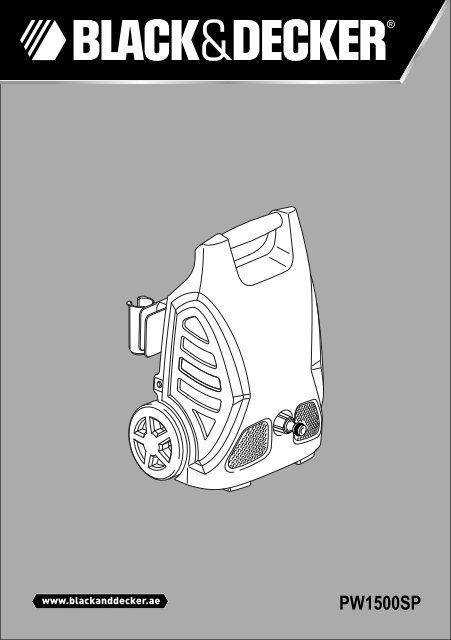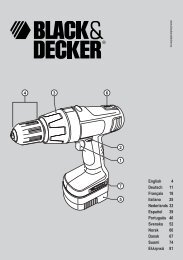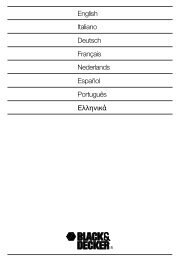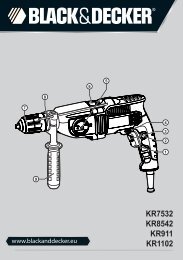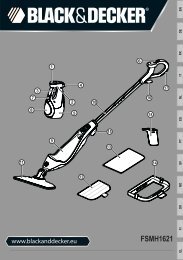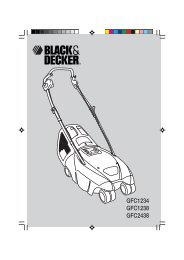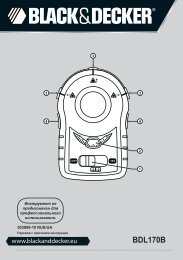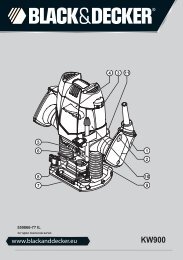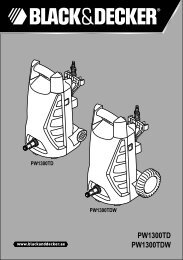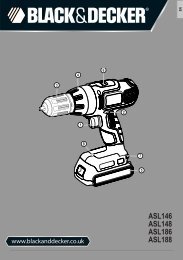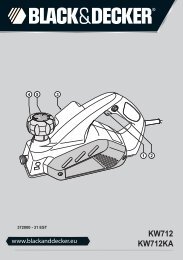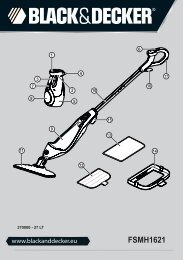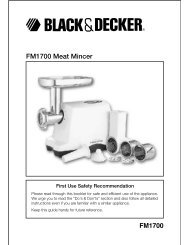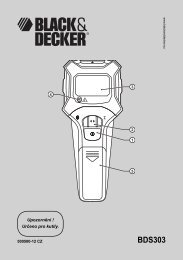Instruction Manual - Service - Black & Decker
Instruction Manual - Service - Black & Decker
Instruction Manual - Service - Black & Decker
Create successful ePaper yourself
Turn your PDF publications into a flip-book with our unique Google optimized e-Paper software.
www.blackanddecker.ae<br />
PW1500SP
2<br />
ENGLISH<br />
B6<br />
B1<br />
A1-A2-A3<br />
B2<br />
C2<br />
B5<br />
B3<br />
B4<br />
1<br />
C3<br />
E3 E1<br />
C4<br />
C1<br />
D
1<br />
3 4 5<br />
Ø13<br />
6 7<br />
2<br />
2<br />
8<br />
ENGLISH<br />
3
4<br />
E<br />
ENGLISH<br />
H<br />
H<br />
3<br />
4<br />
2<br />
I<br />
H<br />
D<br />
1
L1<br />
N<br />
L<br />
S<br />
C<br />
Volt<br />
230 2 x 1,5 mm 2<br />
NO<br />
Z1<br />
NC<br />
S1<br />
T<br />
1~<br />
5<br />
I<br />
M<br />
ENGLISH<br />
1 ÷ 25 m 25 ÷ 50 m<br />
S = Switch<br />
Z1 = Capacitor suppressor<br />
T = Thermal protection<br />
M = Motor<br />
S1 = Pressure switch<br />
2 x 2,5 mm 2<br />
5
6<br />
ENGLISH<br />
Safety instructions<br />
The appliance you have purchased is a technologically<br />
advanced product designed by one of the leading European<br />
manufacturers of high pressure pumps. To obtain the best<br />
performance from your unit, read this booklet carefully and<br />
follow the instructions each time you use it. We congratulate<br />
you on your choice and wish you successful operation.<br />
Safety rules/residual risks<br />
Safety “must nots”<br />
• Do not use the appliance with<br />
inflammable or toxic liquids, or any products which are<br />
not compatible with the correct operation of the<br />
appliance. Explosion or poisoning hazard<br />
• Do not direct the water jet towards people or<br />
animals. Injury hazard<br />
• Do not direct the water jet towards the unit<br />
itself, electrical parts or towards other electrical<br />
equipment. Electric shock hazard<br />
• Do not use the appliance outdoors in case of rain.<br />
Short circuit hazard<br />
• Do not allow children or incompetent persons to<br />
use the appliance. Injury hazard<br />
• Do not touch the plug and/or socket with wet<br />
hands. Electric shock hazard<br />
• Do not use the appliance if the electrical<br />
cable is damaged. Electric shock and short circuit<br />
hazard<br />
• Do not use the appliance if the high pressure<br />
hose is damaged. Explosion hazard<br />
• Do not jam the trigger in the operating position.<br />
Accident hazard<br />
• Check that the data plates are affixed to the<br />
appliance, if not, inform your dealer. Units without plates<br />
must not be used as they are unidentifiable and<br />
potentially dangerous. Accident hazard<br />
• Do not tamper with or adjust the setting of<br />
the safety valve or the safety devices. Explosion hazard<br />
• Do not alter the original diameter of the spray head<br />
nozzle. Hazardous alteration of operating performance<br />
• Do not leave the appliance unattended. Accident<br />
hazard<br />
• Do not move the appliance by pulling on the<br />
electrical cable. Short circuit hazard<br />
• Make sure that cars do not drive over the high pressure<br />
hose.<br />
• Do not move the appliance by pulling on the high<br />
pressure hose.<br />
Explosion hazard<br />
• When directed towards tyres, tyre valves or other<br />
pressurised components, the high pressure jet is<br />
potentially dangerous. Do not use the rotating nozzle kit,<br />
and always keep the jet at a distance of at least 30 cm<br />
during cleaning. Explosion hazard<br />
Safety “musts”<br />
• All electrical conductors must be protected against<br />
the water jet. Short circuit hazard<br />
• The appliance MUST ONLY BE CONNECTED<br />
to an adequate power supply in compliance with all<br />
applicable regulations. Electric shock hazard<br />
• The appliance may cause network noise DURING<br />
startup.<br />
• Use of a safety residual current circuit-breaker<br />
(R.C.C.B.) will provide additional protection for the<br />
operator (30 mA). Models supplied without plug must be<br />
installed by qualified staff. Use only authorized electrical<br />
extension leads with suitable conductor gauge.<br />
•<br />
High pressure may cause parts to rebound: wear all the<br />
protective clothing and equipment needed to ensure the<br />
operator’s safety. Injury hazard<br />
• Before doing work on the appliance, remov e the<br />
plug. Accidental start-up hazard<br />
• Before pressing the trigger, grip the gun firmly to<br />
counteract the recoil. Injury hazard<br />
• Comply with the requirements of the local<br />
water supply company. According to EN 12729 (BA), the<br />
appliance may only be connected to the mains drinking<br />
water supply if a backflow preventer valve with drain<br />
facility is installed in the supply hose. Contamination<br />
hazard
• Maintenance and/or repair of electrical<br />
components must be carried out by qualified staff.<br />
Accident hazard<br />
• DISCHARGE residual pressure before<br />
disconnecting the unit hose. Injury hazard<br />
• Before using the appliance, CHECK every time that<br />
the screws are fully tightened and that there are no<br />
broken or worn parts. Accident hazard<br />
• Only use detergents which will not<br />
corrode the coating materials of the high pressure<br />
hose/electrical cable. Explosion and electric shock<br />
hazard<br />
• Ensure that all people or animals keep a<br />
minimum distance of 16 yd. (15m) away. Injury hazard<br />
General information (fig.1)<br />
Use of the manual<br />
This manual forms an integral part of the appliance and<br />
should be kept for future reference. Please read it carefully<br />
before installing/ using the unit. If the appliance is sold, the<br />
Seller must pass on this manual to the new owner along<br />
with the appliance.<br />
Delivery<br />
The appliance is delivered partially assembled in a<br />
cardboard box. The supply package is illustrated in fig.1.<br />
Documentation supplied with the appliance<br />
• A1 Use and maintenance manual<br />
• A2 Safety instructions<br />
• A3 Declaration of conformity<br />
• A4 Warranty regulations<br />
Disposing of packaging<br />
The packaging materials are not environmental pollutants<br />
but must still be recycled or disposed of in compliance with<br />
the relevant legislation in the country of use.<br />
Safety signs<br />
Comply with the instructions provided by the safety signs<br />
fitted to the appliance.<br />
Check that they are present and legible; otherwise, fit<br />
replacements in the original positions.<br />
ENGLISH<br />
E1 sign – Indicates that the appliance must not be disposed<br />
of as municipal waste; it may be handed in to the dealer on<br />
purchase of a new appliance. The appliance's electrical and<br />
electronic parts must not be reused for improper uses since<br />
they contain substances which constitute health hazards.<br />
Symbols<br />
E2 symbol – Indicates that the appliance is intended<br />
for professional use, i.e. for experienced people informed<br />
about the relative technical, regulatory and legislative<br />
aspects and capable of performing the operations necessary<br />
for the use and maintenance of the appliance.<br />
E3 symbol – Indicates that the appliance is intended<br />
for non-professional (domestic) use.<br />
Technical information (fig.1)<br />
Envisaged use<br />
This appliance has been designed for individual use for the<br />
cleaning of vehicles, machines, boats, masonry, etc, to<br />
remove stubborn dirt using clean water and biodegradable<br />
chemical detergents. Vehicle engines may be washed only if<br />
the dirty water is disposed of as per regulations in force.<br />
• Intake water temperature: see data plate on the<br />
appliance.<br />
• Intake water pressure: min. 0,1MPa-max 1MPa.<br />
• Operating ambient temperature: above 0°C.<br />
• The appliance is compliant with the EN 60335-2-79/A1<br />
standard.<br />
Operator<br />
The symbol on the front cover identifies the appliance’s<br />
intended operator (professional or non-professional).<br />
Improper use<br />
• Use by unskilled persons or those who have not read<br />
and understood the instructions in the manual is<br />
forbidden.<br />
• The introduction of inflammable, explosive and toxic<br />
liquids into the appliance is prohibited.<br />
• Use of the appliance in a potentially inflammable or<br />
explosive atmosphere is forbidden.<br />
• The use of non-original spare parts and any other spare<br />
parts not specifically intended for the model in question is<br />
prohibited.<br />
7
8<br />
ENGLISH<br />
• All modifications to the appliance are prohibited. Any<br />
modifications made to the appliance shall render the<br />
Declaration of Conformity null and void and relieve the<br />
manufacturer of all liability under civil and criminal law.<br />
Main components<br />
• B1 Adjustable spray nozzle<br />
• B2 Lance<br />
• B3 Gun with safety catch<br />
• B4 Power supply cable with plug<br />
• B5 High pressure hose<br />
• B6 Detergent tank (on models with this feature)<br />
Accessories (if included in the supply package –<br />
see fig.1)<br />
• C1 Nozzle cleaning tool<br />
• C2 Rotating nozzle kit<br />
• C3 Handle<br />
• C4 Brush<br />
• C5 Hose reel<br />
Safety devices<br />
Caution - Danger!<br />
Do not tamper with or adjust the safety valve setting.<br />
• Safety valve and/or pressure limiting valve. The safety<br />
valve is also a pressure limiting valve. When the gun<br />
trigger is released, the valve opens and the water<br />
recirculates through the pump inlet or is discharged onto<br />
the ground.<br />
• Thermostat valve (D1 where fitted) If the water<br />
temperature exceeds the temperature set by the<br />
manufacturer, the thermostat valve discharges the hot<br />
water and draws in an amount of cold water equal to the<br />
amount of water discharged, until the correct<br />
temperature is restored.<br />
• Safety catch (D): prevents accidental spraying of water.<br />
Installation (fig.2)<br />
Assembly<br />
Caution - Danger!<br />
All installation and assembly operations must be<br />
performed with the appliance disconnected from the mains<br />
power supply.<br />
The assembly sequence is illustrated in fig.2.<br />
Assembling the rotating nozzle<br />
(For models with this feature)<br />
The rotating nozzle kit delivers greater washing power. Use<br />
of the rotating nozzle may cause of reduction in pressure of<br />
25% compared to the pressure obtained with the adjustable<br />
nozzle. However, the rotating nozzle kit delivers greater<br />
washing power due to the rotation of the water jet.<br />
Electrical connection<br />
Caution - Danger!<br />
Check that the electrical supply voltage and frequency<br />
(V-Hz) correspond to those specified on the appliance data<br />
plate (fig.2). The appliance should only be connected to a<br />
mains power supply equipped with an adequate earth<br />
connection and a differential security breaker (30 mA) to cut<br />
off the electricity supply in the instance of a short circuit.<br />
Use of extension cables<br />
Use cables and plugs featuring “IPX5” protection level. The<br />
cross-section of the extension cable should be proportionate<br />
to its length; the longer it is, the greater its cross-section<br />
should be. See table I.<br />
Water supply connection<br />
Caution - Danger!<br />
Only clean or filtered water should be used for intake. The<br />
delivery of the water intake tap should be equal to that of<br />
pump capacity.<br />
Place the appliance as close to the water supply system as<br />
possible.<br />
Connection points<br />
• Water outlet (OUTLET)<br />
• Water inlet with filter (INLET)<br />
Connection to the mains water supply<br />
The appliance can be connected directly to the mains<br />
drinking water supply only if the supply hose is fitted with a<br />
backflow preventer valve as per current regulations in force.<br />
Make sure that the hose is at least Ø 13 mm and that it is<br />
reinforced.
Adjustment information (fig.3)<br />
Adjusting the spray nozzle<br />
(for models with this feature)<br />
• Water flow is adjusted by regulating the nozzle (E).<br />
Adjusting the detergent<br />
(on models with this feature)<br />
• Detergent flow is adjusted using the regulator (F).<br />
Adjusting the detergent pressure<br />
Set the adjustable nozzle (E) on " - " to deliver detergent at<br />
the correct pressure (on models with this feature).<br />
Adjusting the pressure<br />
(on models with this feature)<br />
• The regulator (G) is used to adjust the working pressure.<br />
The pressure is shown on the pressure gauge (where<br />
fitted).<br />
Information on use of the appliance (fig.4)<br />
Controls<br />
• Starter device (H).<br />
Set the starter switch on (ON/1) to:<br />
a) Start the motor (in models without TSS device);<br />
b) Set the motor ready to start (in models with TSS<br />
device).<br />
• If there is a pilot light on the starter device, it should light<br />
up.<br />
• If the “low/high” settings are available, use them as<br />
follows:<br />
• Low : low pressure washing<br />
• High : high pressure washing<br />
• Set the starter device switch on (OFF/0) to shut down<br />
the appliance.<br />
• If there is a pilot light on the starter device, it should go<br />
out.<br />
• Water jet control lever (I).<br />
Caution - Danger!<br />
During operation the appliance must be positioned as<br />
shown in fig. 4 on a sturdy, stable surface.<br />
Start-up<br />
1) Turn on the water supply tap fully.<br />
2) Release the safety catch (D).<br />
3) Depress the gun trigger for a few seconds and start up<br />
the appliance using the starter device (ON/1).<br />
Caution - Danger!<br />
Before starting up the appliance check that the water supply<br />
hose is connected properly; use of the appliance without<br />
water will damage it; do not cover the ventilation grilles when<br />
the appliance is in use.<br />
TSS models - In TSS models with automatic delivery flow<br />
cut-off system:<br />
• When the gun trigger is released the dynamic pressure<br />
automatically cuts out the motor (see fig.4);<br />
• When the gun trigger is depressed the automatic drop in<br />
pressure starts the motor and the pressure is restored<br />
after a very slight delay;<br />
• If the TSS is to function correctly all gun releasing and<br />
depressing operations must be performed at intervals of<br />
less than 4-5 seconds.<br />
• On three-phase models for professional use, at first use<br />
start the appliance for a very short time to check that the<br />
motor is running in the correct direction. If the motor fan<br />
is turning anti-clockwise, exchange two of the three<br />
phase wires (L1, L2, L3) in the electrical plug.<br />
• To prevent damage to the appliance, do not allow it to<br />
operate dry and when running do not stop the water jet<br />
for more than 10 minutes at a time (for models without<br />
TSS device).<br />
Stopping the appliance<br />
1) Set the starter device switch on (OFF/0).<br />
2) Depress the gun trigger and discharge the residual<br />
pressure inside the hoses.<br />
3) Engage the gun safety catch (D).<br />
Restarting<br />
1) Release the safety catch (D).<br />
2) Depress the gun trigger and discharge the residual air<br />
inside the hoses.<br />
3) Set the starter device on (ON/1).<br />
ENGLISH<br />
9
Storage<br />
10<br />
ENGLISH<br />
1) Switch the appliance off (OFF/0).<br />
2) Remove the plug from the socket.<br />
3) Turn off the water supply tap.<br />
4) Discharge the residual pressure from the gun until all<br />
the water has come out of the nozzle.<br />
5) Drain and wash out the detergent tank at the end of the<br />
working session. To wash out the tank, use clean water<br />
instead of the detergent.<br />
6) Engage the gun safety catch (D).<br />
Refilling and using detergent<br />
When using detergent, the adjustable nozzle must be set on<br />
"-" (on models with this feature).<br />
Use of a high pressure hose longer than the one originally<br />
supplied with the cleaner, or the use of an additional hose<br />
extension, may reduce or completely halt the intake of<br />
detergent.<br />
Fill the tank with highly degradable detergent.<br />
Recommended cleaning procedure<br />
Dissolve dirt by applying the detergent mixed with water to<br />
the surface while still dry.<br />
When dealing with vertical surfaces work from the bottom<br />
upwards.<br />
Leave the detergent to act for 1-2 minutes but do not allow<br />
the surface to dry. Starting from the bottom, use the high<br />
pressure jet at a minimum distance of 30 cm. Do not allow<br />
the rinse water to run onto unwashed surfaces.<br />
In some cases, scrubbing with brushes is needed to remove<br />
dirt.<br />
High pressure is not always the best solution for good<br />
washing results, since it may damage some surfaces. The<br />
finest adjustable nozzle jet setting or the rotating nozzle<br />
should not be used on delicate or painted parts, or on<br />
pressurised components (e.g tyres, inflation valves, etc.).<br />
Effective washing depends on both the pressure and<br />
volume of the water used, to the same degree.<br />
Maintenance (fig.5)<br />
Any maintenance operations not covered by this chapter<br />
should be carried out by an Authorized Sales and <strong>Service</strong><br />
Centre.<br />
Caution - Danger!<br />
Always disconnect the plug from the power socket before<br />
carrying out any work on the appliance.<br />
Cleaning the nozzle<br />
1) Disconnect the lance from the nozzle.<br />
2) Remove any dirt deposits from the nozzle hole using the<br />
tool (C1).<br />
Cleaning the filter<br />
Inspect the intake filter (L) and detergent filter (if fitted)<br />
before each use, and clean in accordance with the<br />
instructions if necessary.<br />
Unjamming the motor (on models with this feature)<br />
In case of lengthy stoppages, limescale sediments may<br />
cause the motor to seize. To unjam the motor, turn the drive<br />
shaft with a tool (M).<br />
End-of-season storage<br />
Treat the appliance with non-corrosive, non-toxic antifreeze<br />
before storing it away for winter.<br />
Put the appliance in a dry place, protected from frost.<br />
Mains plug replacement<br />
(U.K. & Ireland only)<br />
If a new mains plug needs to be fitted:<br />
• Safely dispose of the old plug.<br />
• Connect the brown lead to the live terminal in the new<br />
plug.<br />
• Connect the blue lead to the neutral terminal.<br />
Warning! No connection is to be made to the earth terminal.<br />
Follow the fitting instructions supplied with good quality<br />
plugs. Recommended fuse: 5 A.
Troubleshooting<br />
Problem Possible causes Remedy<br />
ENGLISH<br />
Nozzle worn Replace nozzle<br />
Water filter fouled Clean filter (L) (fig.5)<br />
Water supply pressure low Turn on water supply tap fully<br />
Air being sucked into system Check tightness of hose fittings<br />
Pump does not reach Air in pump Switch off the appliance and keep depressing and<br />
working pressure releasing the gun trigger until the water comes out in<br />
a steady flow. Switch the appliance back on again.<br />
Adjustable nozzle not Turn the adjustable<br />
positioned correctly nozzle (E) (+) (fig.3)<br />
Thermostatic valve tripped Wait for correct water temperature to be restored<br />
Water intake from external tank Connect appliance to the mains water supply<br />
Pressure drops during use Intake water too hot Reduce temperature<br />
Nozzle clogged Clean nozzle (fig.5)<br />
Intake filter (L) dirty Clean filter (L) (fig.5)<br />
Insufficient power supply Check that the voltage of the mains power<br />
supply line is the same as that on the plate (fig.2)<br />
Voltage loss due to use of Check characteristics of extension cable<br />
Motor “sounds” but fails to start extension cable<br />
Appliance not used for a Contact your nearest Authorized <strong>Service</strong> Centre<br />
long period of time<br />
Problems with TSS device Contact your nearest Authorized <strong>Service</strong> Centre<br />
No electrical power Check that the plug is firmly in the socket<br />
and that the mains voltage supply is present (*)<br />
Motor fails to start Problems with TSS device Contact your nearest Authorized <strong>Service</strong> Centre<br />
Appliance not used for a Using the tool (M) unjam the motor<br />
long period of time from the hole at the rear of the appliance<br />
(in models with this feature) (fig.5)<br />
Seals worn Have the seals replaced at your nearest<br />
Water leakage Authorized <strong>Service</strong> Centre<br />
Safety valve tripped and discharging Contact an Authorized <strong>Service</strong> Centre<br />
Appliance noisy Water too hot Reduce temperature (see technical data<br />
Oil leakage Seals worn Contact your nearest Authorized <strong>Service</strong> Centre<br />
TSS versions only: motor starts High pressure system or pump Contact your nearest Authorized <strong>Service</strong> Centre<br />
even with gun trigger is released hydraulic circuit not watertight<br />
TSS versions only: no water<br />
delivery when gun trigger is Nozzle clogged Clean nozzle (fig.5)<br />
depressed (with supply hose<br />
connected)<br />
Adjustable nozzle on high pressure setting Set nozzle on "-" setting (fig.3)<br />
Detergent too dense Dilute with water<br />
No detergent taken in High pressure hose extension being used Fit original hose<br />
Deposits or restriction in detergent circuit Flush with clean water and eliminate any restrictions.<br />
If the problem persists, contact an Authorized <strong>Service</strong> Centre<br />
(*) If the motor starts and does not restart during operation, wait 2-3 minutes before repeating the start-up procedure (overload cutout has<br />
been tripped). If the problem recurs more than once, contact your nearest Authorized <strong>Service</strong> Centre.<br />
11
12<br />
ENGLISH<br />
We declare under our sole responsibility that this product is in conformity with the following standards or standardized<br />
documents<br />
Technical Data<br />
EN 60335-1 - EN 60335-2-79; EN 55014-1; EN 55014-2;<br />
EN 61000-3-2;EN 61000-3-3; EN 61000-3-11; EN 60704-1<br />
In accordance with the regulations:<br />
2006/42/CE, 2006/95/CE, 2002/95/CE, 2002/96/CE, 2004/108/CE, 2000/14/CE<br />
For more information, please contact <strong>Black</strong> & <strong>Decker</strong> at the following address or refer to the back of the manual. The<br />
undersigned is responsible for compilation of the technical file and makes this declaration on behalf of <strong>Black</strong> & <strong>Decker</strong>.<br />
Kevin Hewitt<br />
Vice-President Global Engineering<br />
<strong>Black</strong> & <strong>Decker</strong> Europe, 210 Bath Road, Slough,<br />
Berkshire, SL1 3YD<br />
United Kingdom<br />
04/02/2013<br />
Declaration of conformity<br />
Unit PW1500<br />
Output L/min 6<br />
Pressure MPa 8,5<br />
Maximum pressure MPa 12<br />
Power kW 1,5<br />
T° input °C 50<br />
Maximum input pressure MPa 1<br />
Repulsive force of the gun to the maximum pressure N 9,4<br />
Motor Insulation - Class F<br />
Motor Protection - IPX5<br />
Voltage V/Hz 220-240~1<br />
Maximum allowed net impedance Ω -<br />
Sound level (K=3 dB(A)) : LPA (EN 60704-1) dB (A) 81,2<br />
LWA (EN 60704-1) dB (A) 89<br />
Unit vibrations (K=1,5M/s 2 ) M/s 2 3,72<br />
Weight kg 8
Protecting the environment<br />
Separate collection. This product must not be<br />
disposed of with normal household waste.<br />
Should you find one day that your <strong>Black</strong> & <strong>Decker</strong> product<br />
needs replacement, or if it is of no further use to you, do not<br />
dispose of it with other household waste. Make this product<br />
available for separate collection.<br />
• <strong>Black</strong> & <strong>Decker</strong> provides a facility for recycling <strong>Black</strong> &<br />
<strong>Decker</strong> products once they have reached the end of their<br />
working life. This service is provided free of charge. To<br />
take advantage of this service please return your product<br />
to any authorised repair agent who will collect them on<br />
our behalf.<br />
• You can check the location of your nearest authorised<br />
repair agent by contacting your local <strong>Black</strong> & <strong>Decker</strong><br />
office at the address indicated in this manual.<br />
Alternatively, a list of authorized <strong>Black</strong> & <strong>Decker</strong> repair<br />
agents and full details of our after-sales service and<br />
contact are available on the Internet at:<br />
www.2helpU.com.<br />
Warranty<br />
ENGLISH<br />
<strong>Black</strong> & <strong>Decker</strong> is confident of the quality of its products and<br />
offers an outstanding warranty.<br />
This warranty statement is in addition to and in no way<br />
prejudices your statutory rights.<br />
If a <strong>Black</strong> & <strong>Decker</strong> product becomes defective due to faulty<br />
materials, workmanship or lack of conformity, within 24<br />
months from the date of purchase, <strong>Black</strong> & <strong>Decker</strong> warranty<br />
to replace defective parts, repair products subjected to fair<br />
wear and tear or replace such products to ensure minimum<br />
inconvenience to the customer unless:<br />
• The product has been used for trade, professional or hire<br />
purposes;<br />
• The product has been subjected to misuse or neglect;<br />
• The product has sustained damage through foreign<br />
objects, substances or accidents;<br />
• Repairs have been attempted by persons other than<br />
authorised repair agents or <strong>Black</strong> & <strong>Decker</strong> service staff.<br />
To claim on the warranty, you will need to submit proof of<br />
purchase to the seller or an authorised repair agent. You can<br />
check the location of your nearest authorised repair agent by<br />
contacting your local <strong>Black</strong> & <strong>Decker</strong> office at the address<br />
indicated in this manual.<br />
Alternatively, a list of authorised <strong>Black</strong> & <strong>Decker</strong> repair agents<br />
and full details of our after-sales service and contacts are<br />
available on the Internet at: www.2helpU.com.<br />
13
14<br />
FRANÇAIS<br />
B6<br />
B1<br />
A1-A2-A3<br />
B2<br />
C2<br />
B5<br />
B3<br />
B4<br />
1<br />
C3<br />
E3 E1<br />
C4<br />
C1<br />
D
1<br />
3 4 5<br />
Ø13<br />
6 7<br />
2<br />
2<br />
8<br />
FRANÇAIS<br />
15
16<br />
E<br />
FRANÇAIS<br />
H<br />
H<br />
3<br />
4<br />
2<br />
I<br />
H<br />
D<br />
1
L1<br />
N<br />
L<br />
S<br />
C<br />
Volt<br />
230 2 x 1,5 mm 2<br />
NO<br />
Z1<br />
NC<br />
S1<br />
T<br />
1~<br />
5<br />
I<br />
M<br />
FRANÇAIS<br />
1 ÷ 25 m 25 ÷ 50 m<br />
S = Switch<br />
Z1 = Capacitor suppressor<br />
T = Thermal protection<br />
M = Motor<br />
S1 = Pressure switch<br />
2 x 2,5 mm 2<br />
17
18<br />
FRANÇAIS<br />
<strong>Instruction</strong>s pour la sécurité<br />
L’appareil que vous venez d’acheter est un produit de très<br />
haut niveau technologique réalisé par l’une des entreprises<br />
européennes les plus expertes en la fabrication de pompes<br />
à haute pression. Pour obtenir des performances optimales,<br />
veuillez lire et observer scrupuleusement les instructions<br />
que nous avons formulées à chaque fois que vous utiliserez<br />
cet appareil. Nous vous félicitons de votre choix et vous<br />
souhaitons un bon travail.<br />
Règles de sécurité/risques résiduels<br />
Avertissements: à ne pas faire<br />
• N’utilisez jamais l’appareil avec<br />
des fluides inflammables, toxiques ou dont les<br />
caractéristiques ne sont pas compatibles avec le<br />
fonctionnment correct de l'appareil. danger d’explosion<br />
et d’empoisonnement<br />
• Ne dirigez jamais le jet d’eau contre des<br />
personnes ou des animaux. danger de lesions<br />
• Ne dirigez jamais le jet d’eau contre<br />
l’appareil, les parties électriques ou tout autre appareil<br />
électrique. Danger de choc électrique<br />
• N’utilisez jamais l’appareil en plein air en cas de<br />
pluie. danger de court-circuit<br />
• Ne laissez jamais la machine entre les mains<br />
d’enfants ou de personnel non formé. danger d’accident<br />
• Ne prenez jamais la fiche ou la prise avec les<br />
mains mouillées. Danger de choc électrique<br />
• N’utilisez jamais l’appareil si son câble<br />
électrique est endommagé. danger de choc électrique et<br />
court-circuit<br />
• N’utilisez jamais l’appareil si son tube à<br />
haute pression est endommagé. danger d’explosion<br />
• Ne bloquez pas le levier du pistolet si l’appareil est<br />
en marche. Danger d’accident<br />
• Vérifiez la présence de la plaquette des<br />
caractéristiques sur l’appareil; dans le cas contraire<br />
contactez immédiatement le revendeur. N’utilisez en<br />
aucun cas un appareil dépourvu de plaquette car il<br />
pourrait être dangereux. Danger d’accident<br />
• N’altérez jamais ni modifiez le tarage de la<br />
soupape de réglage et des dispositifs de sécurité.<br />
Danger d’explosion<br />
• Ne modifiez pas le diamètre d’origine du jet de la<br />
tête. Danger! Le fonctionnement risque d’être compromis<br />
• Ne laissez jamais l’appareil sans surveillance.<br />
Danger d’accident<br />
• Ne déplacez jamais l’appareil en le tirant par le<br />
CABLE ELECTRIQUE. Danger de court-circuit<br />
• Évitez le passage de véhicules sur le tuyau haute<br />
pression.<br />
• Ne déplacez pas l’appareil en tirant le tuyau haute<br />
pression. Danger d’explosion<br />
• Le jet haute pression sur pneumatiques, valves de<br />
pneumatiques et autres composants sous pression est<br />
potentiellement dangereux. Évitez l' utilisation du kit buse<br />
rotative et maintenir une distance du jet d’au moins 30<br />
cm pendant le lavage. Danger d’explosion<br />
Avertissements: à faire<br />
• Toutes les parties conductrices de courant<br />
DOIVENT ÊTRE PROTÉ GÉES contre le jet d’eau.<br />
Danger de court-circuit<br />
• Branc hez l’appareil uniquement sur une<br />
source d’électricité appropriée et conforme aux normes<br />
en vigueur. Danger de choc électrique<br />
• PENDANT la mise en marche, l’appareil peut<br />
perturber le réseau.<br />
• Dans ce cas, le fonctionnement avec un disjoncteur<br />
différentiel de sécurité offre une protection personnelle<br />
supplémentaire (30 mA). Sur les modèles sans fiche,<br />
l'installation doit être effectuée par du personnel qualifié.<br />
N’utilisez que des rallonges électriques autorisées et<br />
avec une section appropriée.<br />
•<br />
La haute pression peut faire rebondir les pièces;<br />
PORTEZ toujours des vêtements et des lunettes de<br />
protection. danger de lesions<br />
• Avant d’exécuter toute opération sur l’appareil,<br />
DÉBRA NCHEZ -le l’appareil. Danger de démarrage<br />
accidentel<br />
• A cause du recul, saisissez bien le pistolet lorsque<br />
vous tirez le levier. Danger de lesions
• Respectez les règles de la société des eaux<br />
potables de la région. Suivant EN 12729 (BA), il est<br />
possible de connecter l’appareil directement au réseau<br />
d’eau potable uniquement si la tuyauterie d’alimentation<br />
comporte un dispositif anti-reflux avec vidange. Danger<br />
de pollution<br />
• L’entretien et/ou la réparation des composants<br />
électriques DOIVENT/do it être effectué(s) par du<br />
personnel qualifié. Danger d’accident<br />
• RE LÂCHEZ la pression résiduelle avant de<br />
déconnecter le tube de l’appareil. Danger de lesions<br />
• CONTR ÔLEZ avant toute utilisation et de temps à<br />
autre le serrage des vis et le bon état des composants<br />
de l’appareil. Vérifiez s’il y a des pièces cassées ou<br />
usagées. Danger d’accident<br />
• N’utilisez que des détergents<br />
compatibles avec les matériaux de revêtement du<br />
flexible haute pression/câble électrique. Danger<br />
d’explosion et de choc électrique<br />
• Les personnes ou les animaux DOIVENT<br />
ÊTRE à la distance minimale de 15 m. Danger de<br />
lesions<br />
Informations générales (fig.1)<br />
Utilisation du manuel<br />
Ce manuel fait partie intégrante de l’appareil, le conserver<br />
pour des consultations futures. Le lire attentivement avant<br />
l’installation/ utilisation. En cas de cessions, remettre le<br />
manuel au nouveau propriétaire.<br />
Livraison<br />
L’appareil est livré partiellement démonté, dans un<br />
emballage en carton. La composition de la fourniture est<br />
représentée sur la fig.1<br />
Documentation fournie<br />
• A1 Manuel d’utilisation et d’entretien<br />
• A2 <strong>Instruction</strong>s pour la sécurité<br />
• A3 Déclaration de conformité<br />
• A4 Règles de garantie<br />
Élimination des emballages<br />
Les matériaux de l’emballage ne sont pas polluants pour<br />
l’environnement, toutefois ils doivent être recyclés ou<br />
éliminés conformément aux normes en vigueur dans le pays<br />
d’utilisation.<br />
Signalisations d’information<br />
Respecter les signalisations des plaques appliquées sur<br />
l’appareil.<br />
FRANÇAIS<br />
Vérifier qu’elles soient toujours présentes et lisibles ; dans le<br />
cas contraire, les remplacer en les appliquant dans la<br />
position d’origine.<br />
Plaque E1 – Elle indique l’obligation de ne pas éliminer<br />
l’appareil comme déchet urbain ; il peut être redonné au<br />
distributeur au moment de l’achat d’un appareil neuf. Les<br />
parties électriques et électroniques de l’appareil ne doivent<br />
pas être réutilisées pour usages impropres car elles<br />
contiennent des substances dangereuses pour la santé.<br />
Symboles<br />
Icône E2 – Elle indique que l’appareil est conçu pour<br />
un usage professionnel, c’est-à-dire pour les personnes qui<br />
ont de l’expérience, une connaissance technique, normative,<br />
législative et qui sont en mesure d’exécuter les opérations<br />
nécessaires à l’utilisation et l’entretien de l’appareil.<br />
Icône E3 – Elle indique que l’appareil est conçu pour<br />
une usage non professionnel (domestique).<br />
Informations techniques (fig.1)<br />
Utilisation prévue<br />
Cet appareil a été conçu pour une utilisation individuelle<br />
pour le lavage de véhicules, voitures, navires, façades, etc.,<br />
pour enlever la saleté tenace avec de l’eau propre et des<br />
détergents chimiques biodégradables. Le lavage de moteurs<br />
de véhicules n’est consenti que si l’eau sale est évacuée<br />
selon les normes en vigueur.<br />
• Température de l’eau en entrée : voir plaquette des<br />
caractéristiques techniques sur l’appareil.<br />
• Pression de l’eau en entrée : 0,1MPa mini. - 1MPa maxi.<br />
• Température ambiante de fonctionnement : supérieure à<br />
0°C. L’appareil est conforme à la norme EN<br />
60335-2-79/A1.<br />
Opérateur<br />
Pour identifier l’opérateur chargé de l’utilisation de l’appareil<br />
(professionnel ou non professionnel), voir l’icône<br />
représentée sur la couverture.<br />
Utilisations non consenties<br />
• L’utilisation est interdite aux personnes inexpérimentées<br />
ou qui n’ont pas lu et compris les instructions données<br />
dans ce manuel.<br />
• Il est interdit d’alimenter l’appareil avec des liquides<br />
inflammables, explosifs et toxiques.<br />
• Il est interdit de faire fonctionner l’appareil en<br />
atmosphère potentiellement inflammable ou explosive.<br />
19
20<br />
FRANÇAIS<br />
• Il est interdit d’utiliser des accessoires qui ne sont pas<br />
d’origine et non spécifiques pour le modèle.<br />
• Il est interdit de modifier l’appareil ; toute modification<br />
entraîne l’invalidation de la déclaration de conformité et<br />
exonère le fabricant de toute responsabilité civile et<br />
pénale.<br />
Parties principales<br />
• B1 Tête réglable<br />
• B2 Lance<br />
• B3 Pistolet avec sécurité<br />
• B4 Câble électrique avec fiche<br />
• B5 Tuyau haute pression<br />
• B6 Réservoir à détergent (s’il est prévu)<br />
Accessoires (s’ils sont prévus dans la fourniture -<br />
voir fig.1)<br />
• C1 Outil de nettoyage de la tête<br />
• C2 Kit buse rotative<br />
• C3 Manche<br />
• C4 Brosse<br />
• C5 Enrouleur de flexible<br />
Dispositifs de sécurité<br />
Attention – danger !<br />
Ne pas modifier le tarage de la soupape de sûreté.<br />
• Soupape de sûreté et/ou de limitation de pression. La<br />
soupape de sûreté est aussi une soupape de limitation<br />
de pression. Quand le pistolet se ferme, la soupape<br />
s’ouvre et l’eau recircule par l’aspiration de la pompe ou<br />
est évacuée au sol.<br />
• Soupape thermostatique (D1 si prévue) Si la<br />
température de l’eau dépasse la température prévue par<br />
le fabricant, la soupape thermostatique évacue l’eau<br />
chaude et aspire une quantité d’eau froide égale à l’eau<br />
évacuée jusqu’au rétablissement de la température<br />
correcte.<br />
• Dispositif de sécurité (D) : il évite le jet d’eau accidentel.<br />
Installation (fig.2)<br />
Montage<br />
Attention – danger !<br />
Toutes les opérations d’installation et de montage<br />
doivent être effectuées avec l’appareil débranché.<br />
Pour la séquence de montage voir fig.2.<br />
Montage de la buse rotative<br />
(Pour les modèles qui en sont équipés).<br />
Le kit buse rotative permet une plus grande puissance de<br />
lavage. L'utilisation de la buse rotative peut coïncider avec<br />
une baisse de la pression égale à 25% par rapport à la<br />
pression obtenue avec la tête réglable. Son utilisation<br />
permet une plus grande puissance de lavage grâce à l'effet<br />
rotatif transmis au jet d’eau.<br />
Branchement électrique<br />
Attention – danger !<br />
Vérifier que le voltage et la fréquence (V-Hz) du réseau<br />
électrique correspondent à ceux reportés sur la plaque<br />
d’identification (fig.2). Brancher l’appareil au réseau<br />
électrique ayant une mise à la terre efficace et une<br />
protection différentielle (30 mA) qui interrompt l’alimentation<br />
électrique en cas de court-circuit.<br />
Utilisation des câbles de rallonge Les câbles doivent avoir<br />
un degré de protection « I PX5 ». La section des câbles de<br />
rallonge doit être proportionnée à leur longueur. Plus ils sont<br />
longs et plus la section doit être grande. Voir tableau I.<br />
Raccordement au réseau d’eau<br />
Attention – danger !<br />
Aspirer uniquement de l’eau filtrée ou propre. Le robinet de<br />
prélèvement de l’eau doit garantir une arrivée égale au débit<br />
de la pompe.<br />
Mettre l’appareil le plus près possible du réseau d’eau.<br />
Raccords<br />
• Sortie de l’eau (OUTLET )<br />
• Entrée de l’eau avec filtre (INLET )<br />
Raccordement au réseau d’alimentation en eau public<br />
L’appareil ne peut être raccordé directement au réseau<br />
public de distribution de l’eau potable que si, dans la<br />
tuyauterie d’alimentation, se trouve un dispositif anti-reflux<br />
avec vidange conforme aux normes en vigueur. S’assurer<br />
que le tuyau ait un diamètre d’au moins 13 mm et qu’il soit<br />
renforcé.
Réglages (fig.3)<br />
Réglage de la tête (si prévu)<br />
• Agir sur la tête (E) pour régler le jet d’eau<br />
Réglage du détergent (si prévu)<br />
• Agir sur le régulateur (F) pour doser la quantité de<br />
détergent nécessaire.<br />
Réglage de la distribution de détergent<br />
Mettre la tête réglable (E) en position « » pour distribuer le<br />
détergent à la pression correcte (si prévu).<br />
Réglage de la pression (si prévu)<br />
• Agir sur le régulateur (G) pour changer la pression de<br />
travail. La pression est indiquée par le manomètre (si<br />
présent).<br />
Utilisation (fig.4)<br />
Commandes<br />
• Dispositif de mise en marche (H).<br />
Mettre le dispositif de mise en marche en pos. (ON/1) pour :<br />
a) Faire démarrer le moteur (dans les modèles sans<br />
dispositif TSS )<br />
b) Préparer le moteur pour son fonctionnement (dans les<br />
modèles avec dispositif TSS ).<br />
• Si le dispositif de mise en marche est doté de voyant,<br />
celui-ci doit s’allumer.<br />
• Si les positions « low/high » sont présentes, elles<br />
indiquent :<br />
• Low : nettoyage à basse pression<br />
• High : nettoyage à haute pression<br />
• Mettre le dispositif de mise en marche en pos. (OFF/0)<br />
pour arrêter le fonctionnement de l’appareil.<br />
• Si le dispositif de mise en marche est doté de voyant,<br />
celui-ci doit s’éteindre.<br />
• Levier de commande du jet d’eau (I).<br />
Attention – danger !<br />
L’appareil doit fonctionner posé sur un plan sûr et stable,<br />
positionné comme indiqué sur la fig.4.<br />
Mise en marche<br />
1) Ouvrir complètement le robinet d’arrivée d’eau ;<br />
2) Débloquer la sécurité (D) ;<br />
FRANÇAIS<br />
3) Tenir le pistolet ouvert pendant quelques secondes et<br />
mettre en marche l’appareil avec le dispositif de mise en<br />
marche (ON/1).<br />
Attention – danger !<br />
Avant de mettre en marche l’appareil, vérifier s’il est bien<br />
alimenté en eau ; l’utilisation à sec provoque<br />
l’endommagement de l’appareil. Pendant le fonctionnement,<br />
ne pas couvrir les grilles de ventilation.<br />
Modèles TSS - Dans les modèles TSS , avec interruption<br />
automatique du refoulement :<br />
• en fermant le pistolet, la pression dynamique éteint<br />
automatiquement le moteur électrique (voir fig. 4) ;<br />
• en ouvrant le pistolet, la chute de pression fait partir<br />
automatiquement le moteur et la pression se reforme<br />
avec un tout petit retard ;<br />
• pour un fonctionnement correct du TSS , les opérations<br />
de fermeture et d’ouverture du pistolet ne doivent pas<br />
être effectuées dans un intervalle de temps inférieur à<br />
4÷5 secondes.<br />
• À la première utilisation, dans les modèles triphasés<br />
pour usage professionnel, mettre en marche un bref<br />
instant pour vérifier le sens de rotation du moteur. Si la<br />
rotation du ventilateur du moteur est antihoraire, invertir<br />
deux des trois phases (L1, L2, L3) dans la fiche<br />
électrique.<br />
• Évitez le fonctionnement à sec pour ne pas<br />
endommager l’appareil et pendant son fonctionnement<br />
ne pas interrompre le jet d’eau pour plus de 10 minutes<br />
(pour les modèles sans dispositif TSS).<br />
Arrêt<br />
1) Mettre le dispositif de mise en marche en pos. (OFF/0).<br />
2) Ouvrir le pistolet et décharger la pression à l’intérieur<br />
des tuyauteries.<br />
3) Mettre la sécurité (D).<br />
Remise en marche<br />
1) Débloquer la sécurité (D).<br />
2) Ouvrir le pistolet et laisser sortir l’air prèsent à l’intérieur<br />
des tuyauteries..<br />
3) Mettre le dispositif de mise en marche en pos. (ON/1).<br />
21
22<br />
FRANÇAIS<br />
Mise hors service<br />
1) Éteindre l’appareil (OFF/0).<br />
2) Enlever la fiche de la prise.<br />
3) Fermer le robinet de l’eau.<br />
4) Décharger la pression résiduelle du pistolet jusqu’à ce<br />
que l’eau soit complètement sortie de la tête.<br />
5) Videz et nettoyez le réservoir à détergent à la fin du<br />
travail. Pour le nettoyage du réservoir, utilisez de l’eau<br />
propre au lieu du détergent.<br />
6) Remettre la sécurité (D) du pistolet.<br />
Utilisation du détergent<br />
Le détergent doit être pulvérisé avec la tête réglable en<br />
position «-» (si prévu).<br />
L'utilisation d’un tuyau haute pression plus long que celui<br />
fourni avec l’appareil ou l’utilisation d’une rallonge de tuyau<br />
supplémentaire peut diminuer ou arrêter complètement<br />
l'aspiration du détergent.<br />
Remplir le réservoir de détergent à haute biodégrabilité.<br />
Conseils pour un bon lavage<br />
Pulvériser la surface sèche à nettoyer de détergent mélangé<br />
à l’eau pour dissoudre la saleté.<br />
Sur les surfaces verticales, partir du bas vers le haut.<br />
Laisser agir pendant<br />
1÷2 minutes, sans laisser sécher la surface. Pulvériser un<br />
jet à haute pression à une distance de plus de 30 cm, en<br />
commençant par le bas. Éviter que l’eau de rinçage coule<br />
sur les surfaces non lavées.<br />
Dans certains cas, pour enlever la saleté, l’action<br />
mécanique des brosses est nécessaire.<br />
La pression élevée n’est pas toujours la meilleure solution<br />
pour un bon lavage, car elle peut endommager certaines<br />
surfaces. Il est conseillé d’éviter l’utilisation du jet fin de la<br />
tête réglable et de la buse rotative sur des parties délicates<br />
et peintes et sur des composants sous pression (ex.<br />
pneumatiques, valves de gonflage..).<br />
Un bon lavage dépend, en mesure égale, de la pression et<br />
du volume d’eau.<br />
Entretien (fig.5)<br />
Tous les entretiens dont on ne parle pas dans ce chapitre<br />
doivent être effectués auprès d’un revendeur agréé avec<br />
service après-vente.<br />
Attention – danger !<br />
Avant toute intervention sur l’appareil, le débrancher.<br />
Nettoyage de la tête<br />
1) Démonter la lance du pistolet.<br />
2) Enlever la saleté du trou de la tête avec l’outil (C1).<br />
Nettoyage du filtre<br />
Vérifiez le filtre d’aspiration (L) et le filtre du détergent (si<br />
prévu) avant chaque utilisation et, si nécessaire,<br />
nettoyez-les comme indiqué.<br />
Déblocage du moteur (si prévu)<br />
En cas d’arrêts prolongés, des sédiments calcaires peuvent<br />
provoquer le blocage du moteur. Pour débloquer le moteur,<br />
tourner l’arbre moteur avec l’outil (M).<br />
Remisage d’hiver<br />
Avant ce remisage, faire fonctionner l’appareil avec du<br />
liquide antigel non agressif et non toxique.<br />
Rangez l' appareil dans un endroit sec et à l’abri du gel.<br />
Remplacement des prises secteur (RU et<br />
Irlande uniquement)<br />
Si une nouvelle prise secteur doit être installée :<br />
• Mettez au rebut la vieille prise.<br />
• Branchez le fil brun dans la borne de la nouvelle prise.<br />
• Branchez le fil bleu à la borne neutre.<br />
Attention ! Aucune connexion ne doit être faite à la borne<br />
de terre. Suivez les instructions de montage fournies avec<br />
les prises de bonne qualité. Fusibles recommandés : 13 A.
Anomalies de fonctionnement<br />
Anomalies Causes probables Solutions<br />
Buse usée Remplacer la buse<br />
Filtre de l’eau sale Nettoyer le filtre (L) (fig.5)<br />
Alimentation en eau insuffisante Ouvrir complètement le robinet<br />
La pompe n’atteint pas la Aspiration d’air Contrôler les raccords<br />
FRANÇAIS<br />
pression prescrite Air dans la pompe Éteindre l’appareil et actionner le pistolet jusqu’à la sortie<br />
d’un jet continu. Rallumer.<br />
Mauvais réglage de la tête Tourner la tête (E) (+) (fig.3)<br />
Intervention de la soupape thermostatique Attendre le rétablissement de la température correcte de l’eau<br />
Aspiration d’eau du réservoir extérieur Raccorder l’appareil au réseau d’alimentation en eau<br />
La pompe a des sautes de Température de l’eau en entrée trop élevée Baisser la température<br />
pression Buse obstruée Nettoyer la buse (fig.5)<br />
Filtre d’aspiration (L) sale Nettoyer le filtre (L) (fig.5)<br />
Tension de réseau insuffisante Contrôler que la tension de réseau corresponde à celle de<br />
la plaque (fig.2)<br />
Le moteur « ronfle » mais ne Perte de tension causée par la rallonge Vérifier les caractéristiques de la rallonge<br />
démarre pas Arrêt prolongé de l’appareil Contacter le Centre d’assistance technique agréé<br />
Problèmes au dispositif TSS Contacter le Centre d’assistance technique agréé<br />
Manque de tension Vérifier la présence de tension dans le réseau et contrôler<br />
si la fiche est bien introduite dans la prise (*)<br />
Le moteur électrique ne démarre Problèmes au dispositif TSS Contacter le Centre d’assistance technique agréé<br />
pas Appareil qui n’est plus utilisé Par le trou arrière, débloquer le moteur avec l’outil (M)<br />
depuis longtemps (pour les modèles qui le prévoient) (fig.5)<br />
Joints d’étanchéité usés Remplacer les joints auprès d’un Centre d’assistance<br />
Fuites d’eau technique agréé<br />
Intervention soupape de sûreté à<br />
décharge libre<br />
Contacter le Centre d’assistance technique agréé<br />
Bruit Température de l’eau trop élevée Baisser la température (voir données techniques)<br />
Fuites d’huile Joints d’étanchéité usés Contacter le Centre d’assistance technique agréé<br />
Seulement pour TSS : l’appareil Mauvaise étanchéité du système haute<br />
se met en marche bien que le<br />
pistolet soit fermé<br />
Seulement pour TSS : en tirant le<br />
pression ou dans le circuit de la pompe Contacter le Centre d’assistance technique agréé<br />
levier du pistolet, l’eau ne sort<br />
pas (avec tuyau d’alimentation<br />
introduit)<br />
Buse obstruée Nettoyer la buse (fig.5)<br />
Position de la tête réglable en haute pression Mettre la tête en position «-» (fig.3)<br />
Détergent trop dense Diluer avec de l’eau<br />
Le détergent n’est pas aspiré Utilisation de rallonges tuyau haute pression Remettre le tuyau d’origine<br />
Rincer avec de l’eau propre et éliminer les étranglements<br />
Circuit du détergent encrassé ou étranglé éventuels. Si le problème persiste consulter un Centre<br />
d’assistance technique agréé<br />
(*) Si, au cours du fonctionnement, le moteur s’arrête et ne repart pas, attendre 2-3 minutes avant de tenter de nouveau la mise en marche<br />
(Intervention de la protection thermique). Si l’inconvénient se répète plus d’une fois, contacter le Centre d’assistance technique agréé.<br />
23
24<br />
FRANÇAIS<br />
Déclaration de conformité<br />
Nous déclarons, en assumant la pleine responsabilité de cette déclaration, que le produit est conforme aux<br />
normes suivantes et aux documents correspondants<br />
EN 60335-1 - EN 60335-2-79; EN 55014-1; EN 55014-2;<br />
EN 61000-3-2;EN 61000-3-3; EN 61000-3-11; EN 60704-1<br />
Selon les prescriptions des directives :<br />
2006/42/CE, 2006/95/CE, 2002/95/CE, 2002/96/CE, 2004/108/CE, 2000/14/CE<br />
Pour plus de renseignements, veuillez contacter <strong>Black</strong> & <strong>Decker</strong> à l’adresse suivante ou reportez-vous au dos du manuel. Le<br />
soussigné est responsable des données de la fiche technique et fait cette déclaration au nom de <strong>Black</strong> & <strong>Decker</strong><br />
Kevin Hewitt<br />
Vice-President Global Engineering<br />
<strong>Black</strong> & <strong>Decker</strong> Europe, 210 Bath Road, Slough,<br />
Berkshire, SL1 3YD<br />
Royaume-Uni<br />
04/02/2013<br />
Données Techniques<br />
Unité PW1400TDK<br />
Débit L/min 6<br />
Pression MPa 8,5<br />
Pression maximale MPa 12<br />
Puissance kW 1,5<br />
T° Alimentation °C 50<br />
Pression d’alimentation maximale MPa 1<br />
Force répulsive du pistolet à la pression maximale N 9,4<br />
Isolation du moteur - Classe F<br />
Protection du moteur - IPX5<br />
Tension V/Hz 220-240~1<br />
Impédance du circuit maximale admissible Ω -<br />
Niveau de pression sonore (K=3 dB(A)) : LPA (EN 60704-1) dB (A) 81,2<br />
LWA (EN 60704-1) dB (A) 89<br />
Vibrations de l’appareil (K=1.5M/s2 ) M/s2 3,72<br />
Poids kg 8
Protection de l'environnement<br />
Collecte séparée. Ce produit ne doit pas être jeté<br />
avec les déchets domestiques normaux.<br />
Si vous décidez de remplacer ce produit <strong>Black</strong> & <strong>Decker</strong>, ou<br />
si vous n'en avez plus l'utilité, ne le jetez pas avec vos<br />
déchets domestiques Rendez-le disponible pour une collecte<br />
séparée.<br />
• <strong>Black</strong> & <strong>Decker</strong> fournit un dispositif permettant de<br />
collecter et de recycler les produits <strong>Black</strong> & <strong>Decker</strong><br />
lorsqu'ils ont atteint la fin de leur cycle de vie. Pour<br />
pouvoir profiter de ce service, veuillez retourner votre<br />
produit à un réparateur agréé qui se chargera de le<br />
collecter pour nous.<br />
• Pour connaître l'adresse du réparateur agréé le plus<br />
proche de chez vous, contactez le bureau <strong>Black</strong> &<br />
<strong>Decker</strong> à l'adresse indiquée dans ce manuel. Vous<br />
pourrez aussi trouvez un liste des réparateurs agréés de<br />
<strong>Black</strong> & <strong>Decker</strong> et de plus amples détails sur notre<br />
service après-vente sur le site Internet à l'adresse<br />
suivante : www.2helpU.com<br />
Garantie<br />
FRANÇAIS<br />
<strong>Black</strong> & <strong>Decker</strong> vous assure la qualité de ses produits et vous<br />
offre une garantie très étendue.<br />
Ce certificat de garantie est un document supplémentaire et<br />
ne peut en aucun cas se substituer à vos droits légaux.<br />
Si un produit <strong>Black</strong> & <strong>Decker</strong> s'avère défectueux en raison de<br />
matériaux en mauvais état, d'une erreur humaine, ou d'un<br />
manque de conformité dans les 24 mois suivant la date<br />
d'achat, <strong>Black</strong> & <strong>Decker</strong> garantit le remplacement des pièces<br />
défectueuses, la réparation des produits usés ou cassés ou<br />
remplace ces produits à la convenance du client, sauf dans<br />
les circonstances suivantes :<br />
• Le produit a été utilisé dans un but commercial,<br />
professionnel, ou a été loué.<br />
• Le produit a été mal utilisé ou avec négligence.<br />
• Le produit a subi des dommages à cause de corps<br />
étrangers, de substances ou d'accidents.<br />
• Des réparations ont été tentées par des techniciens ne<br />
faisant pas partie du service technique de <strong>Black</strong> &<br />
<strong>Decker</strong>.<br />
Pour avoir recours à la garantie, il est nécessaire de fournir<br />
une preuve d'achat au vendeur ou à un réparateur agréé.<br />
Pour connaître l'adresse du réparateur agréé le plus proche<br />
de chez vous, contactez le bureau <strong>Black</strong> & <strong>Decker</strong> à<br />
l'adresse indiquée dans ce manuel.<br />
Vous pourrez aussi trouver une liste de réparateurs agréés<br />
de <strong>Black</strong> & <strong>Decker</strong> et de plus amples détails sur notre service<br />
après-vente sur le site Internet à l'adresse suivante :<br />
www.2helpU.com<br />
25
26<br />
ARABIC<br />
¿Éª°†dG<br />
.kGõ«‡ kÉfɪ°V Ωó≤Jh É¡JÉéàæe IOƒéH ôµjO ófBG ∑ÓH ≥ãJ<br />
∫GƒMC’G øe ∫ÉM …CÉH πîj ’h áaÉ°VE’ÉH Gòg ¿Éª°†dG ¿É«H ¿ƒµjh<br />
.á«fƒfÉ≤dG ¥ƒ≤◊ÉH<br />
áYÉæ°üdGh OGƒŸG ܃«Y ÖÑ°ùH kÉÑ«©e ôµjO ófBG ∑ÓH èàæe íÑ°UCG GPEG<br />
ïjQÉJ øe kGô¡°T 24 ¿ƒ°†Z ‘ ôµjO ófBG ∑ÓH øª°†J ,á≤HÉ£ŸG ΩóYh<br />
»∏ÑdG IÉYGôe e äÉéàæŸG ìÓ°UEGh áÑ«©ŸG AGõLC’G ∫GóÑà°SG AGöûdG<br />
AÓª©dG É°VQ øe ócCÉà∏d äÉéàæŸG √òg ∫GóÑà°SG hCG …OÉ©dG ΩGóîà°S’ÉH<br />
:⁄ Ée<br />
.ÒLCÉà∏d hCG á«æ¡e hCG ájQÉŒ ¢VGôZC’ èàæŸG ΩGóîà°SG ” •<br />
.èàæŸG ΩGóîà°SG IAÉ°SEG hCG ∫ɪgEG •<br />
.çOGƒ◊G hCG á«HôZ ¢VGôZCG hCG OGƒe ÖÑ°ùH ∞∏àd èàæŸG ¢Vô©J •<br />
øjôNB’G ¢UÉî°TC’G πÑb øe ìÓ°UE’G äÉ«∏ªY AGôLEG ádhÉfi •<br />
∑ÓÑd HÉàdG áeóÿG ≥jôa hCG º¡H ìöüŸG ìÓ°UE’G AÓch ±ÓîH<br />
.ôµjO ófBG<br />
«ÑdG π«ch hCG FÉÑ∏d AGöûdG äÉÑKEG Ëó≤J Öéj ,¿Éª°†dÉH áÑdÉ£ª∏d<br />
Öàµe á©LGôà óªà©e ìÓ°UEG π«ch ÜôbCG ¿Éµe áaô©e ∂æµÁh .óªà©ŸG<br />
.π«dódG ‘ ¬«dEG QÉ°ûŸG ¿Gƒæ©dG ‘ »∏ëŸG ôµjO ófBG ∑ÓH<br />
ôµjO ófBG ∑ÓH iód øjóªà©ŸG ìÓ°UE’G AÓcƒH áªFÉb ôaƒàJ ɪc<br />
:ÊhεdE’G bƒŸG ≈∏Y ∫É°üJ’Gh «ÑdG ó©H Ée äÉeóN äÉfÉ«Hh<br />
.www.2helpU.com<br />
e èàæŸG Gòg øe ¢ü∏îàdG ΩóY Ωõ∏j .π°üØæŸG ª÷G<br />
.ájOÉ©dG á«dõæŸG áeɪ≤dG<br />
áÄ«ÑdG ájɪM<br />
hCG ,∂H ¢UÉÿG ôµjO ófBG ∑ÓH èàæe ∫GóÑà°SG ΩÉjC’G øe Ωƒj ‘ Ωõd GPEG<br />
πH ,iôNC’G á«dõæŸG áeɪ≤dG e ¬æe ¢ü∏îàJ Óa ,¬eóîà°ùJ ó©J ⁄ GPEG<br />
.π°üØæŸG ªé∏d èàæŸG Gòg áMÉJEG øe ócCÉJ<br />
ófBG ∑ÓH äÉéàæe ôjhóJ IOÉYE’ ≥aôe ôµjO ófBG ∑ÓH ácöT ôaƒJ •<br />
.πª©∏d É¡à«MÓ°U ΩóYh ÉgôªY ájÉ¡f ¤EG É¡dƒ°Uh Oôéà ôµjO<br />
≈Lôj ,áeóÿG √òg øe IOÉØà°SÓd .ÉkfÉ› áeóÿG √òg Ëó≤J ºàjh<br />
√QhóH ¤ƒàj ±ƒ°S …òdGh óªà©e áfÉ«°U π«ch …CG ¤EG èàæŸG IOÉYEG<br />
.ÉæY áHÉ«f äÉéàæŸG ªL<br />
∫ÓN øe óªà©e áfÉ«°U π«ch ÜôbCG bƒe ≈∏Y ±ô©àdG ∂æµÁ •<br />
‘ í°VƒŸG ¿Gƒæ©dG ‘ »∏ëŸG ôµjO ófBG ∑ÓH Öàµe ≈∏Y ∫É°üJ’G<br />
øjóªà©ŸG áfÉ«°üdG AÓcƒH áªFÉb óLƒJ ,∂dP øe k’óHh .π«dódG Gòg<br />
ó©H Ée äÉeóÿ á∏eɵdG π«°UÉØàdGh ôµjO ófBG ∑ÓH ácöûd Ú©HÉàdG<br />
bƒŸG ≈∏Y âfÎfE’G ≈∏Y ÉæH á°UÉÿG ∫É°üJ’G πFÉ°Shh «ÑdG<br />
.www.2helpU.com :ÊhεdE’G
≥```````aGƒ``````à``````dG QGô```````bEG<br />
hCG ÒjÉ©ŸG e ≥aGƒàj èàæŸG Gòg ¿CÉH á°UÉÿG Éæà«dhDƒ°ùe ≈∏Y ô≤of<br />
:á«dÉàdG á«°SÉ«≤dG ≥FÉKƒdG<br />
EN 55014-2h EN 55014-1h EN 60335-1 - EN 60335-2-79<br />
EN 60704-1h EN 61000-3-11h EN 61000-3-3h EN 61000-3-2h<br />
ARABIC<br />
:äÉ¡«LƒàdG ÖLƒÃ<br />
CE/2000/14h CE/2004/108h CE/2002/96h CE/2002/95h CE/2006/95h CE/2006/42<br />
bƒŸG πªëàjh .π«dódG ájÉ¡f ‘ OQGƒdG hCG ‹ÉàdG ¿Gƒæ©dG ≈∏Y ôµjO ófBG ∑ÓÑH ∫É°üJ’G ≈Lôj ,äÉeƒ∏©ŸG øe ójõª∏d<br />
.ôµjO ófBG ∑ÓH øY áHÉ«f QGôbE’G Gòg Ëó≤Jh »æØdG ∞∏ŸG ªL øY á«dhDƒ°ùŸG √ÉfOCG<br />
âjƒ«g øØ«c<br />
á«ŸÉ©dG á°Sóæ¡dG ¢ù«FQ ÖFÉf<br />
ƒ∏°S ,OhQ çÉH 210 ,ÉHQhCG ôµjO ófBG ∑ÓH<br />
SL1 3YD ,ôjÉ°ûcÒH<br />
IóëàŸG áµ∏ªŸG<br />
04/02/2013<br />
á«æØdG äÉfÉ«ÑdG<br />
PW1500 IóMƒdG<br />
6 á≤«bO/Îd êÉàfE’G<br />
8.5 ∫ɵ°SÉH Éé«e §¨°†dG<br />
12 ∫ɵ°SÉH Éé«e §¨°V ≈°übCG<br />
1.5 äGh ƒ∏«c ábÉ£dG<br />
50 ¢Sƒjõ∏«°S ∫ÉNOE’G IQGôM áLQO<br />
1 ∫ɵ°SÉH Éé«e ∫ÉNOEÓd §¨°V ≈°übCG<br />
9.4 øJƒ«f §¨°V ≈°übCG óæY ¢TôdG ¢Só°ùŸ ôaÉæàdG Iƒb<br />
F áÄa - ∑ôëŸG ∫õY<br />
IPX5 - ∑ôëŸG ájɪM<br />
220-240~1 õJÒg/âdƒa »FÉHô¡µdG ó¡÷G<br />
~ Ω »Hô¡µdG QÉ«à∏d á«aÉ°U ábhÉ©e ≈°übCG ≠∏ÑJ<br />
:(A) πÑ«°ùjO 3 = ºé◊G πeÉY) 䃰üdG iƒà°ùe<br />
81.2 (A) πÑ«°ùjO LPA (EN 60704-1)<br />
89 (A) πÑ«°ùjO LWA (EN 60704-1)<br />
3.72 2 á«fÉK/Ω ( 2 á«fÉK/Ω 1.5 =ºé◊G πeÉY) IóMƒdG RGõàgG<br />
8 ºéc ¿RƒdG<br />
27
28<br />
ARABIC<br />
É¡MÓ°UEGh AÉ£NC’G ±É°ûµà°SG<br />
π◊G á∏ªàëŸG ÜÉÑ°SC’G á∏µ°ûŸG<br />
ágƒØdG ∫GóÑà°SG ágƒØdG ∞∏J<br />
(5 πµ°T) (L) í°TôŸG ∞«æJ √É«ŸG í°Tôe OGó°ùfG<br />
ΩÉJ πµ°ûH √É«ŸG Qó°üe QƒÑæ°U íàa √É«ŸG Qó°üe §¨°V ¢VÉØîfG<br />
ΩƒWôÿG äÉÑ«côJ ΩɵMEG øe ≥≤– ΩÉædG πNGO AGƒ¡dG ÜöùJ ¤EG áî°†ŸG ∫ƒ°Uh ΩóY<br />
¢Só°ùe π¨°ûe ôjô–h ≈∏Y §¨°†dG ‘ QGôªà°S’Gh RÉ¡÷G ¥ÓZEG .܃∏£ŸG πª©dG §¨°V<br />
𫨰ûJ IOÉYEG ºK .åHÉK ≥aóàH √É«ŸG êôîJ ≈àM ¢TôdG áî°†ŸG ‘ AGƒg OƒLh<br />
.iôNCG Iôe RÉ¡÷G<br />
áLQO IOÉ©à°SG ≈àM QÉàf’G ºæŸG Ωɪ°üdG ábÉYEG<br />
áë«ë°üdG √É«ŸG IQGôM<br />
¢ù«FôdG √É«ŸG Qó°üà RÉ¡÷G π«°UƒJ »LQÉN ¿GõN øe √É«ŸG ∫ÉNOEG ΩGóîà°S’G AÉæKCG §¨°†dG ¢VÉØîfG<br />
IQGô◊G áLQO ¢†«ØîJ<br />
kGóL áæNÉ°S √É«e ∫ÉNOEG<br />
(5 πµ°T) ágƒØdG ∞«æJ ágƒØdG OGó°ùfG<br />
(5 πµ°T) (L) í°TôŸG ∞«æJ (L) ∫ÉNOE’G í°Tôe ñÉ°ùJG<br />
πKɇ ¢ù«FôdG ábÉ£dG Qó°üe §ÿ »FÉHô¡µdG ó¡÷G ¿CG øe ócCÉàdG ±Éc ÒZ ábÉW Qó°üe<br />
.(2 πµ°T) ‘ áæ«ÑŸG áMƒ∏dG ≈∏Y ÚÑŸG ó¡é∏d<br />
π«°UƒàdG πHÉc ¢üFÉ°üN øe ócCÉàdG π«°UƒJ πHÉc ΩGóîà°SG ÖÑ°ùH »FÉHô¡µdG ó¡÷G ó≤a ¬æµdh kÉJƒ°U ∑ôëŸG QGó°UEG<br />
óªà©e áeóN õcôe ÜôbCÉH ∫É°üJ’G á∏jƒW IóŸ RÉ¡÷G ΩGóîà°SG ΩóY 𫨰ûàdG CGóÑj ’<br />
óªà©e áeóN õcôe ÜôbCÉH ∫É°üJ’G TSS RÉ¡éH á°UÉN πcÉ°ûe<br />
QÉ«àdG òNCÉe ‘ ¢ùHÉ≤dG °Vh ΩɵMEG øe ócCÉàdG á«FÉHô¡c ábÉW OƒLh ΩóY<br />
(*) ¢ù«FôdG »FÉHô¡µdG Qó°üe OƒLhh<br />
óªà©e áeóN õcôe ÜôbCÉH ∫É°üJ’G TSS RÉ¡éH á°UÉN πcÉ°ûe 𫨰ûàdG AóH ‘ ∑ôëŸG π°ûa<br />
≈∏Y IOƒLƒŸG áëàØdG øe ∑ôëŸG ∞«æàd (M) IGOC’G ΩGóîà°SG á∏jƒW IóŸ RÉ¡÷G ΩGóîà°SG ΩóY<br />
(5 πµ°T) (á«°UÉÿG √ò¡H IOhõŸG äGRGô£dG ‘) RÉ¡÷G ô¡X<br />
óªà©e áeóN õcôe ÜôbCG øe ÜöùàdG fGƒe ∫GóÑà°SG ÜöùàdG fGƒe ∞∏J √É«ŸG ÜöùJ<br />
óªà©e áeóN õcôe ÜôbCÉH ∫É°üJ’G √É«ª∏d ¬ØjöüJh ¿ÉeC’G Ωɪ°U π£©J<br />
(á«æØdG äÉfÉ«ÑdG LGQ) IQGô◊G áLQO ¢†«ØîJ<br />
kGóL √É«ŸG IQGôM áLQO ´ÉØJQG RÉ¡÷G 䃰U ´ÉØJQG<br />
óªà©e áeóN õcôe ÜôbCÉH ∫É°üJ’G ÜöùàdG fGƒe ∞∏J âjõdG ÜöùJ<br />
óªà©e áeóN õcôe ÜôbCÉH ∫É°üJ’G ᫵«dhQó«¡dG IôFGódG hCG ØJôŸG §¨°†dG ΩÉf AóH :§≤a TSS äGQGó°UEÉH ¢UÉN<br />
√É«ª∏d á©fÉe â°ù«d áî°†ª∏d ôjô– ∫ÉM ‘ ≈àM ∑ôëŸG 𫨰ûJ<br />
¢TôdG ¢Só°ùe π¨°ûe<br />
ΩóY :§≤a TSS äGQGó°UEÉH ¢UÉN<br />
(5 πµ°T) ágƒØdG ∞«æJ ágƒØdG OGó°ùfG π¨°ûe ≈∏Y §¨°†dG óæY √É«ŸG ∫ƒ°Uh<br />
¢TôdG ¢Só°ùe<br />
(Qó°üŸG ΩƒWôN π«°UƒJ e)<br />
≈∏Y πjó©à∏d á∏HÉ≤dG ágƒØdG §Ñ°V<br />
(5 πµ°T) "-" OGóYE’G ≈∏Y ágƒØdG §Ñ°VG ØJôe §¨°V OGóYE’G<br />
AÉŸÉH ∞æŸG ∞«ØîJ<br />
»∏°UC’G ΩƒWôÿG Ö«côJ ØJôe §¨°V ΩƒWôN á∏°Uh ΩGóîà°SG<br />
kGóL ∞«ãc ∞æŸG ∞æŸG Öë°S ΩóY<br />
äôªà°SG GPEGh .≥FGƒY ájCG ádGREGh áØ«f √É«e aO ÈY ∞«æàdG ∞æŸG IôFGO ‘ ≥FGƒY hCG äÉÑ°SôJ OƒLh<br />
óªà©e áeóN õcôe ÜôbCÉH ∫É°üJ’G ≈LÒa ,á∏µ°ûŸG ∂∏J<br />
AGôLEG π£©J) iôNCG Iôe 𫨰ûàdG AGôLEG IOÉYEG πÑb ≥FÉbO 3 ¤EG 2 øe QÉàf’G ∂«∏Y ,𫨰ûàdG IÎa AÉæKCG 𫨰ûàdG IOÉYEÉH º≤j ⁄h ∑ôëŸG CGóH GPEG (*)<br />
.óªà©e áeóN õcôe ÜôbCÉH ∫É°üJ’G ≈Lôj ,Iôe øe ÌcCG á∏µ°ûŸG äQôµJ GPEGh .(óFGõdG πª◊G óæY £≤dG
(5 πµ°T) áfÉ«°üdG<br />
õcôe ‘ É¡FGôLEG »¨Ñæj π°üØdG √òg ‘ IQƒcòe ÒZ áfÉ«°U äÉ«∏ªY ájCG<br />
.óªà©ŸG äÉ©«ÑŸGh áeóÿG<br />
!ô£N – ôjò–<br />
≈∏Y πªY …CG IöTÉÑe πÑb QÉ«àdG òNCÉe øe ¢ùHÉ≤dG π°üØH kɪFGO ºb<br />
.RÉ¡÷G<br />
ágƒØdG ∞«æJ<br />
.ágƒØdG øe ´GQòdG π°üØH ºb 1<br />
IGOC’G kÉeóîà°ùe ágƒØdG ΩƒWôN øe IQòb äÉÑ°SôJ ájCG ádGREÉH ºb 2<br />
.(C1)<br />
í°TôŸG ∞«æJ<br />
πc πÑb (¬à«ÑãJ ∫ÉM ‘) ∞æŸG í°Tôeh (L) πNóŸG í°Tôe ¢üëØH ºb<br />
.∂dòd áLÉ◊G óæY äɪ«∏©à∏d kÉ≤ah ɪ¡Ø«æàH ºbh ,ΩGóîà°SG<br />
(á«°UÉÿG √ò¡H IOhõŸG äGRGô£dG ‘) ∑ôëŸG ∞«æJ<br />
Ö°SGhôdG ÖÑ°ùàJ ¿CG øµÁ ,á∏jƒW äGÎØd RÉ¡÷G ΩGóîà°SG ΩóY ∫ÉM ‘<br />
∂∏J øe ∑ôëŸG ∞«æJ øµÁ ≈àMh .∑ôëŸG 샪L ‘ á«°ù∏µdG<br />
.(M) IGOC’G ΩGóîà°SÉH IOÉ«≤dG É°üY 𫨰ûJ ≈Lôj ,Ö°SGhôdG<br />
»ª°SƒŸG øjõîàdG<br />
πcBÉà∏d OÉ°†eh Ωƒª°ù∏d OÉ°†eh ó«ªéà∏d OÉ°†Ã RÉ¡÷G á÷É©e ≈Lôj<br />
.ô£ŸG ÖÑ°ùH êQÉÿÉH ¬æjõîJ πÑb<br />
.«≤°üdG øe ¬àjɪ◊ ±ÉL ¿Éµe ‘ RÉ¡÷G °VƒH í°üæj<br />
¢ù«FôdG ¢ùHÉ≤dG ∫GóÑà°SG<br />
(§≤a GóædôjCGh IóëàŸG áµ∏ªŸÉH ¢UÉN)<br />
:»∏j Éà ºb ójóL ¢ù«FQ ¢ùHÉb â«ÑãJ ¤EG áLÉ◊G óæY<br />
.øeCG πµ°ûH Ëó≤dG ¢ùHÉ≤dG øe ¢ü∏îàdG •<br />
.ójó÷G ¢ùHÉ≤dG ‘ π°UƒŸG ±ô£dG e »æÑdG ∂∏°ùdG π«°UƒJ •<br />
.ójó÷G ¢ùHÉ≤dG ‘ ójÉëŸG ±ô£dG e ¥QRC’G ∂∏°ùdG π«°UƒJ •<br />
äɪ«∏©J ´ÉÑJG ≈Lôjh .»°VQC’G ±ô£dÉH π«°UƒJ …CG AGôLEG ôëj !ôjò–<br />
ΩGóîà°SÉH í°üæj ɪc ,IOƒ÷G á«dÉY ¢ùHGƒ≤dG e á≤aôŸG â«ÑãàdG<br />
.A 5 :AÉHô¡µdG ᪰UÉa<br />
ARABIC<br />
øjõîàdG<br />
.(OFF/0) RÉ¡÷G 𫨰ûJ ±É≤jEÉH ºb 1<br />
.QÉ«àdG òNCÉe øe ¢ùHÉ≤dG ádGREÉH ºb 2<br />
.√É«ŸG Qó°üe QƒÑæ°U ¥ÓZEÉH ºb 3<br />
ôNCG êôîJ ≈àM ¢TôdG ¢Só°ùe øe »≤ÑàŸG §¨°†dG ∞jöüàH ºb 4<br />
.√É«ŸG øe Iô£b<br />
‘ ¬∏°ù¨H ºbh ∞æŸG ¿GõN ‘ OƒLƒŸG πFÉ°ùdG ∞jöüàH ºb 5<br />
á«∏ªY ‘ ∞«ædG AÉŸG ΩGóîà°SÉH í°üæjh .𫨰ûàdG á«∏ªY ájÉ¡f<br />
.∞æŸG øe k’óH ¿GõÿG ∞«æJ<br />
.(D) ¢TôdG ¢Só°ùe ¿ÉeCG ¢†Ñ≤e 𫨰ûàH ºb 6<br />
∞æŸG ΩGóîà°SGh áÄÑ©àdG IOÉYEG<br />
°VƒdG ≈∏Y πjó©à∏d á∏HÉ≤dG ágƒØdG §Ñ°V Öéj ,∞æŸG ΩGóîà°SG óæY<br />
(á«°UÉÿG √ò¡H IOhõŸG äGRGô£dG ‘) "-"<br />
RÉ¡L e Ωó≤ŸG »∏°UC’G ΩƒWôÿG ÒZ ØJôe §¨°V ΩƒWôN ΩGóîà°SG<br />
∞æŸG ∫ƒNO øe π∏≤j ób á«aÉ°VEG ΩƒWôN á∏°Uh ΩGóîà°SG hCG ∞«æàdG<br />
.»∏c πµ°ûH ¬dƒNO æÁ hCG<br />
.∑qoQnóqnàdG oπr¡ °S n ∞æà ¿GõÿG Aπà í°üæj<br />
πãeC’G ∞«æàdG AGôLEG<br />
í£°ùdG ≈∏Y AÉŸÉH êhõªŸG ∞æŸG °Vh ÈY ñÉ°ShC’G áHGPEÉH ºb<br />
.±É÷G<br />
.πØ°SC’ ≈∏YCG øe πª©dÉH í°üæj ,á«°SCGôdG í£°SC’G e πeÉ©àdG óæY<br />
´óJ ’h ,á≤«bO 2 ¤EG 1 øe ìhGÎJ IóŸ í£°ùdG ≈∏Y πª©j ∞æŸG ∑ôJG<br />
§¨°V ¢TÉ°TQ kÉeóîà°ùe πØ°SCG øe ∞«æàdG á«∏ªY CGóHGh ,∞éj í£°ùdG<br />
π«°ù¨dG √É«e ´óJ ’h ,πbC’G ≈∏Y º°S 30 QGó≤Ã í£°ùdG øY ó©Ñj ØJôe<br />
.ó©H É¡∏°ùZ ºàj ⁄ »àdG í£°SC’G ≈∏Y §bÉ°ùàJ<br />
.ñÉ°ShC’G ádGRE’ ä’É◊G ¢†©H ‘ ∂dO IÉ°Tôa ΩGóîà°SG Ωõ∏j ób<br />
∞«æJ èFÉàf ≈∏Y ∫ƒ°üë∏d πãeC’G π◊G ƒg kɪFGO ¢ù«d ØJôŸG §¨°†dG<br />
ΩGóîà°SG ΩóY »¨Ñæjh .í£°SC’G ¢†©H ∞∏J ‘ ÖÑ°ùàj ób ¬fEG å«M ,Ió«L<br />
AGõLC’G e IQGhódG ágƒØ∏d hCG πjó©à∏d á∏HÉ≤dG ágƒØ∏d ¢TQ OGóYEG π°†aCG<br />
hCG äGQÉWE’G πãe) §¨°†∏d ¢Vô©àJ »àdG AGõLC’G hCG á°SÉ°ù◊G hCG á«∏£ŸG<br />
.(ÉgÒZh íØædG äÉeɪ°U<br />
᫪ch §¨°†dG ɪg ÚæKG Ú∏eÉY ≈∏Y ∫É©ØdG π«°ù¨dG á«∏ªY óªà©J<br />
.…hÉ°ùàdÉH áeóîà°ùŸG √É«ŸG<br />
29
30<br />
ARABIC<br />
𫨰ûàdG AóH<br />
.ΩÉJ πµ°ûH √É«ŸG Qó°üe QƒÑæ°U íàaG 1<br />
.(D) ¿ÉeC’G ¢†Ñ≤e QôM 2<br />
RÉ¡÷G 𫨰ûJ CGóHGh á∏«∏b ÊGƒãd ¢TôdG ¢Só°ùe π¨°ûe ≈∏Y §¨°VG 3<br />
.(ON/1) 𫨰ûàdG AóH ìÉàØe kÉeóîà°ùe<br />
!ô£N – ôjò–<br />
,í«ë°U πµ°ûH √É«ŸG Qó°üe ΩƒWôN π«°UƒJ øe ócCÉJ ,𫨰ûàdG AóH πÑb<br />
ΩÉ«≤dG ôëjh ,¬Ø∏J ‘ ÖÑ°ùàj √É«e ¿hO RÉ¡÷G ΩGóîà°SG ¿EG å«M<br />
.RÉ¡÷G ΩGóîà°SG AÉæKCG ájƒ¡àdG äɵѰT á«£¨àH<br />
QÉ«àdG £b ΩÉæH IOhõŸG TSS äGRGô£dG ‘ – TSS äGRGô£dG<br />
:»FÉ≤∏àdG<br />
±É≤jEÉH »µ«eÉæjódG §¨°†dG Ωƒ≤j ,¢TôdG ¢Só°ùe π¨°ûe ôjô– óæY •<br />
.(4 πµ°T LGQ) kÉ«FÉ≤∏J ∑ôëŸG<br />
»FÉ≤∏àdG ¢VÉØîf’G ÖÑ°ùàj ,¢TôdG ¢Só°ùe π¨°ûe ≈∏Y §¨°†dG óæY •<br />
‘ ≥HÉ°ùdG √Gƒà°ùŸ §¨°†dG Oƒ©j ºK ,∑ôëŸG 𫨰ûJ ‘ §¨°†dG ‘<br />
.á◊ øe πbCG<br />
ò«ØæJ ºàj ¿CG Öé«a ,í«ë°U πµ°ûH πª©j TSS ΩÉf ¿Éc GPEG •<br />
4 øe πbCG á«æeR äGÎa ≈∏Y ¢TôdG ¢Só°ùe §¨°Vh ôjô– äÉ«∏ªY<br />
.ÊGƒK 5 ¤EG<br />
óæY ,»æ¡ŸG ΩGóîà°S’ÉH á°UÉÿG QGƒWC’G á«KÓK äGRGô£dG ‘ •<br />
ócCÉà∏d IÒ°üb IÎØd RÉ¡÷G 𫨰ûJ CGóHG ,¤hC’G Iôª∏d ΩGóîà°S’G<br />
áMhôe âfÉc GPEGh .í«ë°üdG √ÉŒ’G ‘ Qhój ∑ôëŸG ¿CG øe<br />
áKÓãdG øe ÚæKG π«HóàH ºb ,áYÉ°ùdG ÜQÉ≤Y ¢ùµY QhóJ ∑ôëŸG<br />
.»FÉHô¡µdG ¢ùHÉ≤dG ‘ (L1, L2, L3) ∑Ó°SCG<br />
AÉæKCGh .√É«e ¿hO RÉ¡÷G 𫨰ûàH º≤J ’ ,RÉ¡÷G ∞∏J Öæéàd •<br />
‘ ≥FÉbO 10 øY ójõJ IóŸ √É«ŸG ¢TÉ°TQ ±É≤jEÉH º≤J ’ ,𫨰ûàdG<br />
(TSS RÉ¡L É¡H ôaGƒàj ’ »àdG äGRGô£dÉH ¢UÉN) IóMGƒdG IôŸG<br />
RÉ¡÷G 𫨰ûJ ±É≤jEG<br />
.(OFF/0) °VƒdG ≈∏Y 𫨰ûàdG AóH ìÉàØe §Ñ°VG 1<br />
»≤ÑàŸG §¨°†dG ∞jöüàH ºbh ¢TôdG ¢Só°ùe π¨°ûe ≈∏Y §¨°VG 2<br />
.º«WGôÿG πNGO<br />
.(D) ¢TôdG ¢Só°ùe ¿ÉeCG ¢†Ñ≤e π¨°T 3<br />
𫨰ûàdG IOÉYEG<br />
.(D) ¿ÉeC’G ¢†Ñ≤e QôM 1<br />
»≤ÑàŸG AGƒ¡dG ∞jöüàH ºbh ¢TôdG ¢Só°ùe π¨°ûe ≈∏Y §¨°VG 2<br />
.º«WGôÿG πNGO<br />
.(ON/1) °VƒdG ≈∏Y 𫨰ûJ AóH ìÉàØe §Ñ°VG 3<br />
(3 πµ°T) §Ñ°†dG äÉeƒ∏©e<br />
¢TôdG ágƒa §Ñ°V<br />
(á«°UÉÿG √ò¡H IOhõŸG äGRGô£dÉH ¢UÉN)<br />
.(E) ágƒØdG πjó©J ÈY √É«ŸG ≥aóJ §Ñ°V ºàj •<br />
∞æŸG §Ñ°V<br />
(á«°UÉÿG √ò¡H IOhõŸG äGRGô£dÉH ¢UÉN)<br />
.(F) ºæŸG ΩGóîà°SÉH ∞æŸG ≥aóJ §Ñ°V ºàj •<br />
∞æŸG §¨°V §Ñ°V<br />
≈∏Y ∫ƒ°üë∏d " - " °VƒdG ≈∏Y (E) πjó©à∏d á∏HÉ≤dG ágƒØdG §Ñ°VG<br />
(á«°UÉÿG √ò¡H IOhõŸG äGRGô£dÉH ¢UÉN) Ö°SÉæŸG §¨°†dÉH ∞æŸG<br />
§¨°†dG §Ñ°V<br />
(á«°UÉÿG √ò¡H IOhõŸG äGRGô£dÉH ¢UÉN)<br />
᪫b ¢VôY ºàjh .§¨°†dG §Ñ°†d (G) ºæŸG ΩGóîà°SG ºàj •<br />
.(¬à«ÑãJ ∫ÉM ‘) §¨°†dG ¢SÉ«≤e ≈∏Y §¨°†dG<br />
(4 πµ°T) RÉ¡÷G Ωóîà°SG ∫ƒM äÉeƒ∏©e<br />
ºµëàdG öUÉæY<br />
.(H) 𫨰ûàdG AóH ìÉàØe •<br />
:πLCG øe (ON/1) °VƒdG ≈∏Y 𫨰ûàdG AóH ìÉàØe §Ñ°VG<br />
(TSS RÉ¡L É¡H ôaGƒàj ’ »àdG äGRGô£dG ‘) ∑ôëŸG 𫨰ûJ AóH (a<br />
É¡H ôaGƒàj »àdG äGRGô£dG ‘) 𫨰ûàdG AóÑd √OGóYEGh ∑ôëŸG §Ñ°V (b<br />
(TSS RÉ¡L<br />
¿CG »¨Ñæ«a ,𫨰ûàdG AóH ìÉàØe ≈∏Y »∏«dO Qƒf ∑Éæg ¿Éc GPEG •<br />
.Å°†j<br />
É¡eGóîà°SÉH º≤a ,IôaGƒàe "ØJôe/¢†Øîæe" äGOGóYE’G âfÉc GPEG •<br />
:»∏j ɪc<br />
¢†Øîæe §¨°V π«°ùZ :¢†Øîæe •<br />
ØJôe §¨°V π«°ùZ :ØJôe •<br />
𫨰ûJ ±É≤jE’ (OFF/0) °VƒdG ≈∏Y 𫨰ûàdG AóH ìÉàØe §Ñ°VG •<br />
.RÉ¡÷G<br />
¿CG »¨Ñæ«a ,𫨰ûàdG AóH ìÉàØe ≈∏Y »∏«dO Qƒf ∑Éæg ¿Éc GPEG •<br />
.»Øàîj<br />
.(I) √É«ŸG ¢TÉ°TQ ‘ ºµëàdG ´GQP •<br />
!ô£N – ôjò–<br />
ÚÑe ƒg ɪc Úàeh âHÉK í£°S ≈∏Y RÉ¡÷G °Vh Öéj ,𫨰ûàdG AÉæKCG<br />
.4 πµ°ûdG ‘
.¢ù«FôdG ábÉ£dG Qó°üe<br />
.2 πµ°ûdG ‘ «ªéàdG á«∏ªY π°ù∏°ùJ ô¡j<br />
IQGhódG ágƒØdG «ªŒ<br />
(á«°UÉÿG √ò¡H IOhõŸG äGRGô£dÉH ¢UÉN)<br />
ágƒØdG ΩGóîà°SG ¿CG ’EG .ÈcCG π«°ùZ Iƒb IQGhódG ágƒØdG á©£b ôaƒJ<br />
§¨°†dÉH áfQÉ≤ŸÉH 25% áÑ°ùæH §¨°†dG ¢†«ØîJ ‘ ÖÑ°ùàj ób IQGhódG<br />
IQGhódG ágƒØdG á©£b ôaƒJ ∂dP eh ,πjó©à∏d á∏HÉ≤dG ágƒØdG øe QOÉ°üdG<br />
.√É«ŸG ¢TÉ°Tôd á«fGQhódG ácô◊G ÖÑ°ùH ÈcCG π«°ùZ Iƒb<br />
»FÉHô¡µdG π«°UƒàdG<br />
!ô£N – ôjò–<br />
e »FÉHô¡µdG QÉ«àdG Qó°üe (õJôg-âdƒa) OOôJh ó¡L ≥HÉ£J øe ócCÉJ<br />
»¨Ñæjh .(2 πµ°T) RÉ¡÷G äÉfÉ«H áMƒd ≈∏Y OóëŸG OOÎdGh ó¡÷G<br />
»°VQCG π«°UƒàH OhõŸG ¢ù«FôdG ábÉ£dG Qó°üe e §≤a RÉ¡÷G π«°UƒJ<br />
AÉHô¡µdG Qó°üe £≤d (ÒÑeCG »∏∏«e 30) »∏°VÉØJ ¿ÉeCG WÉbh Ö°SÉæe<br />
.»FÉHô¡c ¢SÉ“ çhóM ∫ÉM ‘<br />
π«°UƒàdG äÓHÉc ΩGóîà°SG<br />
,“IPX5” ájɪ◊G iƒà°ùà ∞°üàJ »àdG äÓHɵdG ΩGóîà°SG ≈Lôj<br />
ɪ∏c …CG ,¬dƒW e π«°UƒàdG πHɵd »°Vô©dG £≤ŸG Ö°SÉæàj ¿CG »¨Ñæjh<br />
.1 ∫hó÷G LGQ .»°Vô©dG ¬©£≤e ójõj ¿CG »¨Ñæj ,¬dƒW OGR<br />
√É«ŸG Qó°üe π«°UƒJ<br />
!ô£N – ôjò–<br />
.áî°†ŸG πNóe e §≤a áë°TôŸGh áØ«ædG √É«ŸG ΩGóîà°SG Öéj<br />
e √É«ŸG ∫ÉNOEG QƒÑæ°U øe IOQGƒdG √É«ŸG ᫪c ihÉ°ùàJ ¿CG »¨Ñæjh<br />
.áî°†ŸG á©°S<br />
.¿ÉµeE’G Qób √É«ŸG Qó°üe ΩÉf øe Üô≤dÉH RÉ¡÷G °Vh »¨Ñæj<br />
π«°UƒàdG •É≤f<br />
(êôîŸG) √É«ŸG êôfl •<br />
(πNóŸG) í°Tôe e √É«ŸG πNóe •<br />
¢ù«FôdG √É«ŸG Qó°üà π«°UƒàdG<br />
â«ÑãJ •öûH IöTÉÑe ¢ù«FôdG √É«ŸG Qó°üà RÉ¡÷G π«°UƒJ øµÁ<br />
᫪«æàdG íFGƒ∏d kÉ≤ah »Ø∏ÿG ≥aódG fÉe Ωɪ°U e Qó°üŸG ΩƒWôN<br />
º∏e 13 øY π≤j ’ ΩƒWôÿG ∂ª°S ¿CG øe ócCÉàdG ≈Lôjh .á≤Ñ£ŸG á«dÉ◊G<br />
.iƒ≤e ¬fCGh<br />
ARABIC<br />
ájCG AGôLEG Èà©jh .RÉ¡÷G ≈∏Y äÓjó©àdG «ªL AGôLEG ôëj •<br />
áeP AGôHEGh ≥aGƒàdG QGôbEG AɨdEG ‘ kÉÑÑ°S RÉ¡÷G ≈∏Y äÓjó©J<br />
.»FÉæ÷Gh ÊóŸG ¿ƒfÉ≤dG ÖLƒÃ äÉ«dhDƒ°ùŸG «ªL øe pæ°üoŸG n<br />
á°ù«FôdG äÉfƒµŸG<br />
πjó©à∏d á∏HÉ≤dG ¢TÉ°TôdG ágƒa B1 •<br />
´GQP B2 •<br />
¿ÉeCG ¢†Ñ≤e e ¢TQ ¢Só°ùe B3 •<br />
¢ùHÉb e ábÉ£dG Qó°üe πHÉc B4 •<br />
ØJôŸG §¨°†dG ΩƒWôN B5 •<br />
(á«°UÉÿG √ò¡H IOhõŸG äÓjOƒŸG ‘) ∞æŸG ¿GõN B6 •<br />
ôfG – ójQƒàdG IƒÑY ‘ IOƒLƒe âfÉc GPEG) äÉ≤ë∏ŸG<br />
(1 πµ°T<br />
ágƒØdG ∞«æJ IGOCG C1 •<br />
IQGhódG ágƒØdG á©£b C2 •<br />
¢†Ñ≤ŸG C3 •<br />
IÉ°TôØdG C4 •<br />
ΩƒWôÿG IôµH C5 •<br />
¿ÉeC’G Iõ¡LCG<br />
!ô£N – ôjò–<br />
.¿ÉeC’G Ωɪ°U OGóYEG πjó©àH hCG åÑ©dÉH º≤J ’<br />
ƒg ¿ÉeC’G Ωɪ°U Èà©j .§¨°†dG ójó– Ωɪ°U hCG/h ¿ÉeC’G Ωɪ°U •<br />
íàa ºàj ,¢TôdG ¢Só°ùe π¨°ûe ôjô– óæYh ,§¨°†dG ójó– Ωɪ°U<br />
É¡ØjöüJ ºàj hCG áî°†ŸG πNóe ÈY É¡JQhO √É«ŸG ó«©Jh Ωɪ°üdG<br />
.¢VQC’G ≈∏Y<br />
áLQO äRhÉŒ ∫ÉM ‘ .(¬à«ÑãJ ∫ÉM ‘ D1) ºæe Ωɪ°U •<br />
Ωɪ°üdG Ωƒ≤j ,mæ°üoŸG n πÑb øe IOóëŸG áLQódG √É«ŸG IQGôM<br />
IOQÉÑdG √É«ŸG øe ᫪c Öë°Sh áæNÉ°ùdG √É«ŸG ∞jöüàH ºæŸG<br />
¤EG ∫ƒ°UƒdG ºàj ≈àM ,É¡ØjöüJ ” »àdG √É«ŸG ᫪µd ájhÉ°ùe<br />
.áë«ë°üdG IQGô◊G áLQO<br />
.√É«ª∏d » °Vnôn©dG p ¢TôdG æÁ :(D) ¿ÉeC’G ¢†Ñ≤e •<br />
(2 πµ°T) Ö«cÎdG<br />
«ªéàdG<br />
!ô£N – ôjò–<br />
øe RÉ¡÷G π°üa e «ªéàdGh Ö«cÎdG äÉ«∏ªY «ªéH ΩÉ«≤dG Öéj<br />
31
32<br />
ARABIC<br />
äÉjÉØædG óMCG √QÉÑàYÉH RÉ¡÷G øe ¢ü∏îàdG ôM ¤EG Ò°ûJ E1- áeÓY<br />
ôëjh .ójóL RÉ¡L AGöT óæY ôLÉà∏d ¬ª«∏°ùJ øµÁ ɉEG ,á«dõæŸG<br />
ÒZ ¢VGôZCG ‘ RÉ¡é∏d á«FÉHô¡µdGh á«fhεdE’G AGõLC’G ΩGóîà°SG<br />
.á«ë°U ôWÉfl ≈∏Y …ƒ£æJ OGƒe ≈∏Y …ƒà– É¡fEG å«M áÑ°SÉæe<br />
RƒeôdG<br />
ΩGóîà°SÓd kÉ°ü«°üN ºª°üe RÉ¡÷G ¿CG ¤EG Ò°ûj – E2 õeôdG<br />
á«æØdG ÖfGƒ÷G ≈∏Y Ú©∏£ŸG IÈÿG …hP ¢UÉî°TCÓd …CG ,»æ¡ŸG<br />
äÉ«∏ª©dG ò«ØæJ ≈∏Y øjQOÉ≤dGh ,á∏°üdG äGP á«©jöûàdGh ᫪«æàdGh<br />
.RÉ¡÷G áfÉ«°Uh ΩGóîà°S’ áeRÓdG<br />
πLCG øe kÉ°ü«°üN ºª°üe RÉ¡÷G ¿CG ¤EG Ò°ûj – E3 õeôdG<br />
.(‹õæŸG) »æ¡ŸG ÒZ ΩGóîà°S’G<br />
(1 πµ°T) á«æØdG äÉeƒ∏©ŸG<br />
Qƒ°üàŸG ΩGóîà°S’G<br />
∞«æJ πLCG øe »°üî°ûdG ΩGóîà°SÓd kÉ°ü«°üN RÉ¡÷G Gòg º«ª°üJ ”<br />
ñÉ°ShC’G ádGREG Gòch ,ÉgÒZh AÉæÑdG IQÉéMh ÜQGƒ≤dGh ä’B’Gh äÉÑcôŸG<br />
á«FÉ«ª«µdG äÉØæŸGh áØ«ædG √É«ŸG ΩGóîà°SG ÈY á«°ü©à°ùŸG<br />
äÉcôfi ∞«æJ ‘ RÉ¡÷G ΩGóîà°SG øµÁ ɪc . ∑ qoQnóqnàdG á«Lƒdƒ«H<br />
᫪«æàdG íFGƒ∏d kÉ≤ah áî°ùàŸG √É«ŸG øe ¢ü∏îàdG •öûH áÑcôŸG<br />
.á≤Ñ£ŸG<br />
RÉ¡÷G ≈∏Y áàÑãŸG äÉfÉ«ÑdG ìƒd ôfG :πNGódG AÉŸG §¨°V •<br />
ó◊G - ∫ɵ°SÉH Éé«e 0.1 ≈fOC’G ó◊G :πNGódG AÉŸG §¨°V •<br />
∫ɵ°SÉH Éé«e 1 ≈°übC’G<br />
. rΩ 0¥ƒa :𫨰ûàdG §«fi IQGôM áLQO •<br />
.EN 60335-2-79/A1 QÉ«©ŸG e ≥aGƒàe RÉ¡÷G •<br />
π¨°ûŸG<br />
RÉ¡÷G Gò¡d Ö°SÉæŸG π¨°ûŸG Oóëj »eÉeC’G AÉ£¨dG ≈∏Y OƒLƒŸG õeôdG<br />
.(»æ¡e ÒZ hCG »æ¡e)<br />
í«ë°üdG ÒZ ΩGóîà°S’G<br />
∂dP ≈∏Y ÚHQóŸG ÒZ ¢UÉî°TC’G πÑb øe RÉ¡÷G ΩGóîà°SG ôëj •<br />
IOQGƒdG äɪ«∏©àdG Gƒª¡Øjh GhDhô≤j ⁄ øjòdG ¢UÉî°TC’G πÑb øe hCG<br />
.ΩGóîà°S’G π«dO ‘<br />
πNGO áeÉ°ùdG hCG IôéØàŸG hCG ∫É©à°TÓd á∏HÉ≤dG πFGƒ°ùdG °Vh ôëj •<br />
.RÉ¡÷G<br />
á°VôY hCG kɪª°ùe ¬fƒc πªàëj §«fi ‘ RÉ¡÷G ΩGóîà°SG ôëj •<br />
.QÉéØfÓd<br />
iôNCG QÉ«Z £b ájCG Gòch á«∏°UC’G ÒZ QÉ«¨dG £b ΩGóîà°SG ôëj •<br />
.ÉæjójCG ÚH OƒLƒŸG RGô£dG Gò¡d á°ü°üfl ÒZ<br />
äÉfƒµŸG ìÓ°UEG hCG/h áfÉ«°U á«∏ªY ò«ØæJ Öéj •<br />
çOGƒ◊G ô£N .πgDƒe πªY ≥jôa ᣰSGƒH á«FÉHô¡µdG<br />
.IóMƒdG ΩƒWôN π°üa πÑb »≤ÑàŸG §¨°†dG ∞jöüJ Öéj •<br />
áHÉ°UE’G ô£N<br />
AGõLCG OƒLh ΩóYh »ZGÈdG ΩɵMEG øe kɪFGO ócCÉàdG ≈Lôj •<br />
çOGƒ◊G ô£N .RÉ¡÷G ΩGóîà°SG πÑb IQƒ°ùµe hCG áØdÉJ<br />
ÖÑ°ùàJ ’ »àdG äÉØæŸG ΩGóîà°SG Öéj •<br />
πѵdG/ØJôŸG §¨°†dG ΩƒWôîH á°UÉÿG AÓ£dG OGƒe πcBÉJ ‘<br />
»FÉHô¡µdG<br />
øY äÉfGƒ«◊G hCG ¢UÉî°TC’G «ªL OÉ©àHG øe ócCÉJ •<br />
.(Îe 15) IOQÉj 16 øY π≤j ’ Éà RÉ¡÷G<br />
(1 πµ°T) áeÉY äÉeƒ∏©e<br />
ΩGóîà°S’G π«dO ΩGóîà°SG<br />
´ƒLô∏d ¬H ®ÉØàM’G »¨Ñæjh ,RÉ¡÷G øe CGõéàj ’ kAõL π«dódG Gòg ó©j<br />
ΩGóîà°SG/Ö«côJ πÑb kGó«L π«dódG Gòg IAGôb ≈Lôjh .kÓÑ≤à°ùe ¬«dEG<br />
π«dódG Gòg Ëó≤J FÉÑdG ≈∏Y Öéj ,RÉ¡÷G √òg «H ∫ÉM ‘h .IóMƒdG<br />
.ójó÷G ∂dÉŸG ¤EG RÉ¡÷G e<br />
º«∏°ùàdG<br />
IƒÑY .ʃJôc ¥hóæ°U ‘ »FõL πµ°ûH Öcôe ƒgh RÉ¡÷G Gòg º∏°ùj<br />
.1 πµ°ûdG ‘ áë°VƒŸG ójQƒàdG<br />
RÉ¡÷G e áeó≤ŸG ≥FÉKƒdG<br />
.ΩGóîà°S’Gh áfÉ«°üdG π«dO A1 •<br />
.áeÓ°ùdG äɪ«∏©J A2 •<br />
.≥aGƒàdG QGôbEG A3 •<br />
¿Éª°†∏d áªæŸG íFGƒ∏dG A4 •<br />
IƒÑ©dG øe ¢ü∏îàdG<br />
IOÉYEG Öéj ¬fCG ’EG ,áÄ«Ñ∏d çƒ∏ŸG ´ƒædG øe â°ù«d IƒÑ©∏d áfƒµŸG OGƒŸG<br />
ádhO ‘ Ö°SÉæŸG jöûàdG e ≥aGƒàj Éà ɡæe ¢ü∏îàdG hCG ÉgôjhóJ<br />
.ΩGóîà°S’G<br />
áeÓ°ùdG äÉeÓY<br />
áàÑãŸG áeÓ°ùdG äÉeÓY É¡«dEG Ò°ûJ »àdG äɪ«∏©àdÉH ΩGõàd’G »¨Ñæj<br />
.RÉ¡÷G ≈∏Y<br />
∫ÉM ‘h ,IAhô≤eh IOƒLƒe áeÓ°ùdG äÉeÓY «ªL ¿CG øe ócCÉJ<br />
É¡©°Vƒe ¢ùØf ‘ á∏jóÑdG äÉeÓ©dG âÑãàH ºb ,∂dP ÒZ ±É°ûàcG<br />
.»∏°UC’G
ô£N Ò«¨J .¢TÉ°TôdG ¢SCGQ ágƒØd »∏°UC’G ô£≤dG Ò«¨J ôëj •<br />
𫨰ûàdG AGOC’<br />
çOGƒ◊G ô£N .áHÉbQ ¿hO RÉ¡÷G ∑ôJ ôëj •<br />
ô£N .»FÉHô¡µdG πѵdG Öë°S ÈY RÉ¡÷G ∂jô– ôëj •<br />
»FÉHô¡c ¢SÉ“<br />
ØJôŸG §¨°†dG ΩƒWôN ≈∏Y äGQÉ«°ùdG Qhôe ΩóY øe ócCÉJ •<br />
ô£N .ØJôŸG §¨°†dG ΩƒWôN Öë°S ÈY RÉ¡÷G ∂jô– ôëj •<br />
QÉéØf’G<br />
øe ÉgÒZ hCG QÉWE’G äÉeɪ°U hCG äGQÉWE’G ¤EG ¢TÉ°TôdG ¬«LƒJ óæY •<br />
ØJôŸG §¨°†dG ¢TÉ°TQ ΩGóîà°SG …ƒ£æj ,§¨°†∏d á°Vô©àŸG AGõLC’G<br />
Öéjh ,IQGhódG ágƒØdG á©£b ΩGóîà°SG ôëjh .kÉÑdÉZ ôWÉfl ≈∏Y<br />
á«∏ªY AÉæKCG πbC’G ≈∏Y Ϊ«àæ°S 30 ó©H ≈∏Y kɪFGO ¢TÉ°TôdG π©L<br />
QÉéØf’G ô£N .∞«æàdG<br />
áeÓ°ùdG "äÉjQhöV"<br />
.√É«ŸG ¢TÉ°TQ øe AÉHô¡µdG äÓ°Uƒe «ªL ájɪM Öéj •<br />
»FÉHô¡c ¢SÉ“ ô£N<br />
kÉ«°TÉ“ Ö°SÉæe ábÉW Qó°üà §≤a RÉ¡÷G π«°UƒJ Öéj •<br />
á«FÉHô¡µdG áeó°üdG ô£N .á≤Ñ£ŸG ᫪«æàdG íFGƒ∏dG áaÉc e<br />
.𫨰ûàdG AóH AÉæKCG ¢ûjƒ°ûJ äÉHòHP RÉ¡÷G Gòg çóëj ób •<br />
ájɪ◊G øe ójõe ôaƒj »≤ÑàŸG QÉ«àdÉH πª©j IôFGO WÉb ΩGóîà°SG •<br />
,¢ùHÉb ¿hóH áeó≤ŸG äGRGô£dG ÉeCG .(ÒÑeCG »∏∏«e 30) π¨°ûª∏d<br />
∑Ó°SCG ΩGóîà°SG Öéjh .πgDƒe πªY ≥jôa ᣰSGƒH É¡Ñ«côJ Öé«a<br />
.Ö°SÉæŸG π°UƒŸG ¢SÉ«≤e e Ióª©àŸG »FÉHô¡µdG π«°UƒàdG<br />
AGóJQG Ωõ∏j Gòd ,AGõLC’G ¢†©H OGóJQG ‘ ‹É©dG §¨°†dG ÖÑ°ùàj ób<br />
.π¨°ûŸG áeÓ°S ¿Éª°†d áeRÓdG á«bGƒdG äGó©ŸGh ¢ùHÓŸG «ªL<br />
áHÉ°UE’G ô£N<br />
ô£N .¢ùHÉ≤dG ádGREG ≈Lôj ,RÉ¡÷G ≈∏Y πª©dG IöTÉÑe πÑb •<br />
á«°Vô©dG ájGóÑdG<br />
¢Só°ùe ∑É°ùeEG ≈Lôj ,¢TôdG ¢Só°ùe π¨°ûe ≈∏Y §¨°†dG πÑb •<br />
áHÉ°UE’G ô£N .√OGóJQ’ kÉÑ°ù– ΩɵMEÉH ¢TôdG<br />
.á«∏ëŸG √É«ŸG ójQƒJ ácöT äÉÑ∏£àà ΩGõàd’G ≈Lôj •<br />
e §≤a RÉ¡÷G π«°UƒJ øµÁ ,EN 12729 (BA) QÉ«©ª∏d kÉ≤aƒa<br />
≥aódG fÉe Ωɪ°U â«ÑãJ ∫ÉM ‘ ¢ù«FôdG ÜöûdG √É«e Qó°üe<br />
çƒ∏àdG ô£N .Qó°üŸG ΩƒWôN ‘ ±öüdG IGOCG e »Ø∏ÿG<br />
•<br />
ARABIC<br />
áeÓ°ùdG äɪ«∏©J<br />
kÉ«LƒdƒæµJ Ωó≤àe èàæe ƒg ¬FGöûH âªb …òdG RÉ¡÷G ¿CÉH º∏©dG ≈Lôj<br />
‘ Ú°ü°üîàŸG Ú«HhQhC’G «æ°üàdG OGhQ óMCG πÑb øe ¬ª«ª°üJ ”<br />
,IóMƒdG √ò¡d AGOCG π°†aCG ≈∏Y ∫ƒ°üë∏dh .ØJôŸG §¨°†dG äÉî°†e<br />
kÉehO É¡«a IOQGƒdG äɪ«∏©àdG ´ÉÑJGh ,ájÉæ©H IöûædG √òg IAGôb ≈Lôj<br />
∂d ≈æªàfh ≥aƒŸG ∑QÉ«àNG ≈∏Y ∂Äæ¡f øëfh .RÉ¡÷G ΩGóîà°SG óæY<br />
.áëLÉf 𫨰ûJ á«∏ªY<br />
áæeɵdG ôWÉîŸG/áeÓ°ùdG óYGƒb<br />
áeÓ°ùdG "äGQƒfi"<br />
πFGƒ°ùdG e RÉ¡÷G ΩGóîà°SG ôëj •<br />
e ≈°TɪàJ ’ äÉéàæe ájCG hCG áeÉ°ùdG πFGƒ°ùdG hCG ∫É©à°T’G á©jöS<br />
.ºª°ùàdG hCG QÉéØf’G ô£N .RÉ¡é∏d í«ë°üdG 𫨰ûàdG<br />
hCG ¢UÉî°TC’G ¤EG √É«ŸG ¢TÉ°TQ ¬«LƒJ ôëj •<br />
¥GÎM’G ô£N .äÉfGƒ«◊G<br />
¤EG hCG É¡JGP IóMƒdG ¤EG √É«ŸG ¢TÉ°TQ ¬«LƒJ ôëj •<br />
ô£N .iôNC’G á«FÉHô¡µdG äGó©ŸG ¤EG hCG á«FÉHô¡µdG AGõLC’G<br />
á«FÉHô¡µdG áeó°üdG<br />
ô£N .ô£ŸG ádÉM ‘ ∫õæŸG êQÉN RÉ¡÷G ΩGóîà°SG ôëj •<br />
»FÉHô¡µdG ¢SɪàdG<br />
Ú∏gDƒŸG ÒZ ¢UÉî°TC’G hCG ∫ÉØWCÓd ìɪ°ùdG ôëj •<br />
áHÉ°UE’G ô£N .RÉ¡÷G ΩGóîà°SÉH<br />
.AÉŸÉH á∏àÑŸG ó«dÉH ¢ùÑ≤ŸG hCG/h ¢ùHÉ≤dG ¢ùŸ ôëj •<br />
á«FÉHô¡µdG áeó°üdG ô£N<br />
πHɵdG ∞∏J ∫ÉM ‘ RÉ¡÷G ΩGóîà°SG ôëj •<br />
»FÉHô¡µdG ¢SɪàdGh á«FÉHô¡µdG áeó°üdG ô£N .»FÉHô¡µdG<br />
§¨°†dG ΩƒWôN ∞∏J ∫ÉM ‘ RÉ¡÷G ΩGóîà°SG ôëj •<br />
QÉéØf’G ô£N .‹É©dG<br />
.QGôªà°SÉH 𫨰ûàdG °Vh ‘ ¢TôdG ¢Só°ùe π¨°ûe π©Œ ’ •<br />
çOGƒ◊G ô£N<br />
∫ÉM ‘h ,RÉ¡÷G ≈∏Y äÉfÉ«ÑdG äÉMƒd âÑãJ øe ≥≤– •<br />
ôëjh .∂dòH ´RƒŸG ÆÓHEG ≈Lôj ,äÉMƒ∏dG ∂∏J OƒLh ΩóY<br />
Qò©àj å«M ,äÉMƒ∏dG ∂∏J É¡H óLƒj ’ »àdG äGóMƒdG ΩGóîà°SG<br />
çOGƒ◊G ô£N .kÉÑdÉZ IQƒ£N ≈∏Y É¡eGóîà°SG iƒ£æjh É¡Øjô©J<br />
Iõ¡LCG hCG ¿ÉeC’G Ωɪ°U OGóYEG πjó©J hCG åÑ©dG ôëj •<br />
QÉéØf’G ô£N .¿ÉeC’G<br />
33
34<br />
ARABIC<br />
L1<br />
N<br />
L<br />
S<br />
C<br />
Volt<br />
5<br />
230 2 x 1,5 mm 2<br />
NO<br />
Z1<br />
NC<br />
S1<br />
T<br />
1~<br />
I<br />
M<br />
1 ÷ 25 m 25 ÷ 50 m<br />
2 x 2,5 mm 2<br />
S ìÉàØe<br />
Z1 ¢ûjƒ°ûàdG fÉe ∞ãµe<br />
T ájQGô◊G ájÉbƒdG<br />
M ∑ôëŸG<br />
S1 §¨°†dG ìÉàØe
E<br />
H<br />
H<br />
3<br />
4<br />
2<br />
I<br />
H<br />
ARABIC<br />
D<br />
1<br />
35
36<br />
1<br />
ARABIC<br />
3 4 5<br />
Ø13<br />
6 7<br />
2<br />
2<br />
8
B6<br />
B1<br />
A1-A2-A3<br />
B2<br />
C2<br />
B5<br />
B3<br />
B4<br />
1<br />
C3<br />
ARABIC<br />
E3 E1<br />
C4<br />
C1<br />
D<br />
37
N a m e s & A d d r e s s e s f o r B l a c k & D e c k e r S e r v i c e C o n c e s s i o n a r i e s<br />
ALGERIA: SARL Outillage Corporation, After Sale <strong>Service</strong> Center-08, Rue Mohamed Boudiaf - Cheraga, Algiers, Algeria,<br />
Tel: +213 21 375131, Fax: +213-0-369667. BAHRAIN: Alfouz <strong>Service</strong>s Co. WLL, P.O. Box 26562, Tubli, Manama, Tel:<br />
+973-17783562 / 17879987, Fax: +973-17783479. EGYPT: Anasia Egypt for Trading S.A.E, P.O. Box 2443, 9, Mostafa<br />
Refaat Street, Sheraton Heliopolis 11361, Cairo, Tel: +202-22684159, Fax: +202-22684169. ETHIOPIA: Seif Sherif Trade<br />
PLC -Arada Sub City, Kebele 01-02, Global Insurance Bldg., 2nd Flr. Room 43, P.O.Box 2525, Addis Ababa, Ethiopia, Tel:<br />
00-251-11-1563968/ 1563969, Fax: 00-251-11-1558009. IRAQ: Financial Links, Kazzaz Building Arasat Al-Hindia Block No:<br />
629 Street: 31Building No: 1 Baghdad – Iraq, Tel: +964 (0)780 195 2223 /+ 964 (0)781 3763044. JORDAN: Bashiti<br />
Hardware, 93 King Abdullah 2nd St., Opp ELBA House, P.O. Box 3005, Tel: +962-6-5349098 ext.11, Fax: +962-6-5330731.<br />
KENYA: Leading Concepts, P.O. Box: 40877-00100, Nairobi, Kenya. Tel: +254 20 690 5000, Fax: +254 20 690 5111.<br />
KUWAIT: Al Omar Technical Co., P.O. Box 4062, Safat 13041, Kuwait, Tel: +965-24848595 / 24840039, Fax:<br />
+965-24845652. LEBANON: Aces <strong>Service</strong> Centre, P.O. Box 90-102, Nahr El Mot, Seaside Highway, Pharaon Building,<br />
Beirut. Tel: 00961-1-898989, Fax: 00961-1-245880. LIBYA: Homeworld Co., Building No.5, Senidal St., Amr Ibn Elaas Road,<br />
Benghazi, Libya. Tel: 00218-61-9094183. <strong>Service</strong> Center1 - Benghazi: Tel: +218-061-3383994, Fax: +218-092-7640688,<br />
<strong>Service</strong> Center2 - Tripoli: Tel: +218-021-3606430, Fax: +218-092-6514813. MALTA: John G Cassar Ltd. 36-Victory Street,<br />
Qormi QRM 06, Malta. Tel: +356-21493251, Fax: +356-21483231. MAURITIUS: J.M. Goupille & Co. Ltd., Rogers Industrial<br />
Park 1, Riche Terre, Mauritius, Tel: +230 206 9450/ +230 207 1700, Fax: +230 206 9474/ +230 248 3188. MOROCCO:<br />
UATS, No. 37, Lotissement KADIRIA, km 10 Route Eljadida - LISASSFA, Casablanca, Morocco, Tel: +212 522652602, Fax:<br />
+212522652603. NIGERIA: Dana Electronics Ltd. (Lagos) 116/ 120, Apapa Oshodi Express Way, Isolo, Lagos, Nigeria. Tel:<br />
+234-17431818/ +234-8037767774/ +234-8057445477. (Abuja) 18, A.E. Ekukinam Street, Off Obsfemi Awolowo Road,<br />
Utako, Abuja, Nigeria. Tel: +234-8032276101/ +234-8037767774. (Kano) 9A - Mai Malari Road, Bompai, Kano, Nigeria. Tel:<br />
+234-8053294947/ +234-8037767774. OMAN: Oman Marketing & <strong>Service</strong> Co. (Omasco), P.O. Box 2734, Behind Honda<br />
Showroom, Wattayah, Oman, Tel: +968-24560232/ 24560255, Fax: +968-24560993. Oman Marketing & <strong>Service</strong> Co.<br />
(Omasco), Al Ohi, Sohar, Oman, Tel: +968-26846379, Fax: +968-26846379. Oman Marketing & <strong>Service</strong> Co. (Omasco) -<br />
Sanaya, Salalah, Oman, Tel: 00968-23212290, Fax: +968-23210936. PAKISTAN: Ammar <strong>Service</strong> & Spares - 60-Bank<br />
Arcade, Serai Road, Karachi, Pakistan, Tel: 0092-21-32426905, Fax: 0092-21-32427214. QATAR: Al Muftah <strong>Service</strong> Centre,<br />
Al Wakrah Road, P.O. Box 875, Doha, Qatar. Tel: 00974-4650880/ 4650110/ 4446868, Fax: 00974-4441415/ 4662599.<br />
SAUDI ARABIA: (Dammam) Al Bawardi Tools & Hardware, P.O. Box 112, Dammam, Tel: (966-3) 8330780 Ext.24 / 8348585<br />
Ext. 24 / +966-3-8335555, Fax: (966-3) 8336303. Fawaz Ebrahim Al Zayani Trading Est. P.O. Box 76026, Al Raka #31952,<br />
Tel: +966-3-8140914, Fax: +966-3-8140824. (Al Hassa) Al Bawardi Tools & Hardware, P.O. Box 16905, Jeddah 21474, Tel:<br />
(966-2) 6444547 / 6439035 / 6456095, Fax: (966-2) 6439024. (Jeddah) Banaja Trading Co. Ltd, P.O. Box 366,<br />
Jeddah-21411, Tel: +966-2-6511111, Fax: +966-2-6503668. (Riyadh) Al Bawardi Tools & Hardware, P.O. Box 68, Riyadh<br />
11411, Tel: (966-1) 4484999, Fax: (966-1) 4487877. Banaja Trading Co. Ltd, P.O. Box 566, Riyadh-11421, Tel:<br />
00966-1-4124444, Fax: +966-1-4033378. SOUTH AFRICA: Benray Tool Wholesalers C.C., 460 Koeberg Road, Cape Town,<br />
South Africa, Tel: 021 551 7244, Fax: 021 552 6395. Stanley <strong>Black</strong> & <strong>Decker</strong> - RSA, 1199 Winze Drive Stormill Ext 9<br />
Roodepoort, Tel: (2711) 472 0454, Fax: (2711) 472 0482. TUNISIA: Société Tunisienne De Manutention - Rue de la<br />
Physique, Nouvelle Zone Industrielle de Ben Arous-2013 Tunisie, Tel: +216 79 389687 Fax:+216 71 385154 ext 216.<br />
UGANDA: Anisuma Investment and <strong>Service</strong>s Ltd., J R complex, Ware House No.5, Plot No 101, 3rd Street Industrial Area,<br />
Jinja Road, Kampala, Tel: +256-414237106. UAE: (Abu Dhabi) Galaxy Equipment Trading, Madinath Zayed (Baada Zaid),<br />
Abu Dhabi, P.C. 58910, Tel: +971-2-8844279, Fax: +971-2-8844297. Light House Electrical, P.O. Box 120, Abu Dhabi, Tel:<br />
+971-2-6726131, Fax: +971-2-6720667. (Al Ain) Zillion Equipment and Spare Parts Trading LLC, P.O. Box 19740, Opp. Bin<br />
Sadal/Trimix Redymix Sanaiya, Al Ain. Tel: +971-3-7216690, Fax:+971-3-7216103 (Dubai) <strong>Black</strong> & <strong>Decker</strong> (Overseas)<br />
GmbH, P.O. Box 5420, Dubai, Tel: +971-4-8127400/ 8127406, Fax: +971-4-2822765. (Musaffah) Light House Electrical, P.O.<br />
Box 120, Abu Dhabi, Tel: +971-2-5548315, Fax: +971-2-5540461. (Sharjah) Mc Coy Middle East LLC, P.O. Box 25793,<br />
Sharjah, Tel: +971-6-5395931, Fax: +971-6-5395932. (Ras Al Khaimah) Mc Coy Middle East LLC, P.O.Box 10584, Ras Al<br />
Khaimah, Tel: +971-7-2277095, Fax: +971-7-2277096. YEMEN: (Aden) Middle East Trading Co. Muala St., Tel: +967 2<br />
222670, Fax: +967 2 222670. (Sana'a) Middle East Trad. Co. Ltd., P.O. Box 12363, Hayel Street, Sana'a. Tel:<br />
+967-1-204201, Fax: +967-1-204204. (Taiz) Middle East Trading Co. (METCO), 5th Flr.Hayel Saeed Anam Bldg,<br />
Al-Mugamma St. Taiz, Yemen, Tel: +967-4-213455, Fax: +967-4-219869.
YOUR NAME/<br />
YOUR ADDRESS<br />
POSTCODE<br />
DATE OF PURCHASE<br />
DEALER'S NAME & ADDRESS/<br />
PRODUCT MODEL NO. PW1500SP<br />
«ùßr<br />
WARRANTY REGISTRATION CARD<br />
«∞FMu«Ê<br />
«∞d±e «∞∂d¥bÍ<br />
¢U¸¥a «∞Ad«¡<br />
≈ßr Ë ´Mu«Ê «∞∂Uzl


